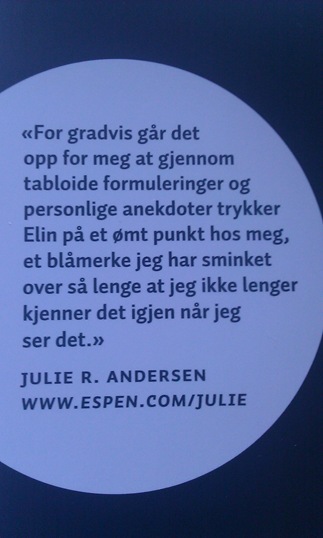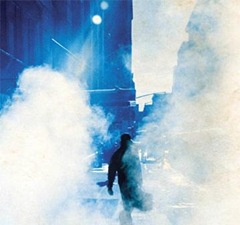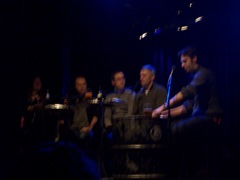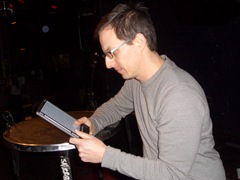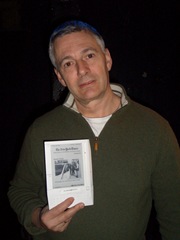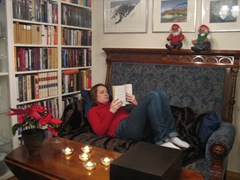April 17, 2011
Sitert
Jeg er sitert på omslaget av Elin Ørjasæters bok Det glade vanvidd (2. opplag).
For å finne ut hva jeg mener, les hele bloggposten jeg skrev om boken.
Og les boken selvfølgelig.
Posted by Julie at 12:51 PM | TrackBack
April 6, 2011
Not leaving
You may well wonder why I wanted Boris at all, a man who tells his still-wife that he's shacking up with his new squeeze for "practical reasons", as if this shocking new arrangement is simply a matter of New York real estate. I wondered why I wanted him myself. Had Boris left me after two years or even ten, the damage would have been considerably less. Thirty years is a long time, and a marriage acquires an ingrown, almost incestuous quality, with complex rhythms of feeling, dialogue and associations. We had come to the point where listening to a story or anecdote at a dinner party would simultaniously prompt the same thought in our two heads, and it was simply a matter of which one of us would articulate it first. Our memories had also begun to mingle. Boris would swear up and down that he was the one who came upon the great blue heron standing on the doorstep of the house we rented in Maine, and I am just as certain that I saw the enormous bird alone and told him about it. There is no answer to the riddle, no documentation - just the flimsy, shifting tissue of remembering and imagining. One of us had listened to the other tell the story, had seen in his or her mind the encounter with the bird, and had created a memory from the mental images that accompanied the heard narrative. Inside and outside are easily confused. You and I. Boris and Mia.
- From The Summer Without Men by Siri Hustvedt.
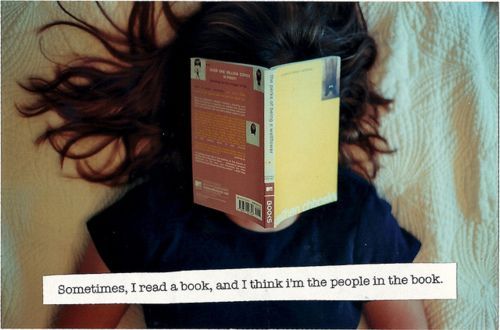
Siri Hustvedt's The Summer Without Men starts with Boris leaving Mia, and follows Mia's summer of interacting only with women. It's about mothers and daughters, old friends, new friends, and the cruelty of teenage girls. And it's about what happens when your Most Important Person over the last thirty years just leaves.
I haven't known anyone for thirty years, for obvious reasons. But as always, Hustvedt's characters seem so real that I find myself relating to them anyway. I told my mom - who's known my dad since they were seventeen - the story of the heron, and she could relate.
And I can certainly understand the feeling of losing part of yourself when you lose an Important Person. Or rather, feeling like you can't let that person go, because even if you never see them again, your personalities are so entwined that they will always be with you - in your memories, your associations, your tastes, in the way your mind works.
In another book I recently read, love was defined like this: "Love means not leaving." Maybe it is that simple.
More posts about Hustvedt's books:
- Nye venner fra Hustvedt (my review of Sorrows of an American, in Norwegian)
- Reuniting with Leo
Image: icanread
Posted by Julie at 10:51 AM | TrackBack
March 22, 2011
Stein fra glasshus
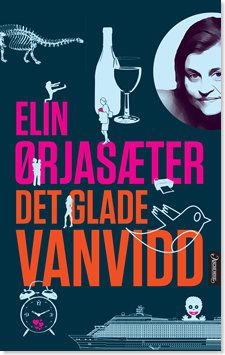 Å lese Elin Ørjasæters nyeste bok, Det glade vanvidd, føles som å lese hele arkivet til en blogg på én dag: Den er en samling relativt korte meningsbærende tekster hvis eneste åpenbare sammenheng er at de har samme jeg-person. Her er hva Elin mener om tårer, foreldremøter, psykiske diagnoser, cruise, kosmetisk kirurgi, vinterferie og telegiro (faktisk). Det er velskrevet, og - siden jeg i E24 til tider fungerer som Elins korrekturleser legger jeg merke til dette - med påfallende få språkfeil. Men etter noen sider har jeg en potensielt bitende kritikk klar: Hva er nå poenget med dette da? Man skal være ganske interessert i Elin personlig for å skjønne vitsen.
Å lese Elin Ørjasæters nyeste bok, Det glade vanvidd, føles som å lese hele arkivet til en blogg på én dag: Den er en samling relativt korte meningsbærende tekster hvis eneste åpenbare sammenheng er at de har samme jeg-person. Her er hva Elin mener om tårer, foreldremøter, psykiske diagnoser, cruise, kosmetisk kirurgi, vinterferie og telegiro (faktisk). Det er velskrevet, og - siden jeg i E24 til tider fungerer som Elins korrekturleser legger jeg merke til dette - med påfallende få språkfeil. Men etter noen sider har jeg en potensielt bitende kritikk klar: Hva er nå poenget med dette da? Man skal være ganske interessert i Elin personlig for å skjønne vitsen.
Dette blir imidlertid ingen bitende kritikk. For gradvis går det opp for meg at gjennom tabloide formuleringer og personlige anekdoter trykker Elin på et ømt punkt hos meg, et blåmerke jeg har sminket over så lenge at jeg ikke lenger kjenner det igjen når jeg ser det.
"Moderskapet er alle kvinners, også feministers, såre punkt. Stikk oss her, og vi er forsvarsløse," skriver Elin.
På dette tidspunktet - side 52 - har Elin presentert leseren for forskerkvinnen, næringslivskvinnen, grunderkvinnen og kvinnene som gråter (det vil si de fleste av oss, selv om det ikke gir oss mer rett i konflikter. Mer om det senere). Fellesnevneren er rollesjongleringen kvinner driver med.
Det er her tekstene kommer litt for nært ting jeg prøver å ikke tenke for mye på.
Jeg er vokst opp med en pappa som først var doktorgradsstudent (altså alltid opptatt) og så foreleser/førsteamanuensis/konsulent/skribent/blogger (altså fortsatt alltid opptatt). Og en mamma som var hjemme. Pappa jobbet 200%. Pappa var kanskje i Kina, kanskje i India, kanskje inne på hjemmekontoret - jeg hadde ikke helt oversikt. Pappa måtte ikke forstyrres fordi han skulle ta eksamen. Mamma kunne høre hvordan dagen min hadde gått på hvordan jeg åpnet inngangsdøren. Mamma sørget for at jeg hadde hjemmebakt brød i matpakken (amerikanere kan ikke grovbrød). Mamma farget klærne mine fordi ingen butikker solgte svarte barneklær og sydde kostymer uansett hva jeg ville kle meg ut som. Mamma var alltid tilgjengelig.
I A-magasinet svarer en leser på et intervju med Elin: "Hun tør å si at hun angrer på at hun valgte karriere fremfor barna, det er det ikke mange som gjør. Jeg er en firebarnsmor som har valgt barn og familie fremfor karriere, og jeg er lei av alle disse karrieremammaene som alltid klager på dårlig tid, rekker ikke ditt, rekker ikke datt. Jeg får alltid høre: "Så rolige barn du har, hva har dere gjort?" - Hallo! Vi er der for dem, de trenger ikke streve etter oppmerksomhet!"
 Og når jeg leser sånt, får jeg vondt i magen. Jeg kan ikke være hjemme med barn. Jeg blir rastløs av å være i min egen leilighet én dag. På mange måter håper jeg at jeg blir som foreldrene mine, men jeg kommer ikke til å rekke å være som dem begge på en gang. Og hvis jeg måtte valgt i dag, ville jeg blitt som pappa når jeg blir stor. Fordi jeg oppriktig tror at å være hjemmeværende ville gjort meg deprimert.
Og når jeg leser sånt, får jeg vondt i magen. Jeg kan ikke være hjemme med barn. Jeg blir rastløs av å være i min egen leilighet én dag. På mange måter håper jeg at jeg blir som foreldrene mine, men jeg kommer ikke til å rekke å være som dem begge på en gang. Og hvis jeg måtte valgt i dag, ville jeg blitt som pappa når jeg blir stor. Fordi jeg oppriktig tror at å være hjemmeværende ville gjort meg deprimert.
Nå representerer foreldrene mine motsatt side av en skala der de fleste norske kvinner i dag befinner seg nærmere midten. Utfordringen min kommer til å være å finne en balanse mellom de egenskapene jeg beundrer hos hver av dem.
Og det er nettopp det jeg kommer til å ta med meg fra Elins bok: Hun innrømmer at dette er en utfordring. At akkurat disse problemstillingene er vanskeligere for kvinner enn for menn, og at selv om det er blitt bedre, er det fortsatt ikke perfekt.
Alternativt kan man si at bokens poeng er å finne på side 138, der Elin skriver "Det er en dyd å ta seg sammen." Boken er et eneste stort SKJERP DEG! til overfølsomme, hypersensitive, politisk korrekte mennesker med diverse vage diagnoser. Og til meg, som sitter her og bekymrer meg for en hjem/karriere-balanse som (potensielt) ligger mange år inn i min egen fremtid.
Og til Elin selv, for hun er heldigvis klar over det når hun sitter i glasshus. Hun skriver for eksempel at alt kan spøkes med, unntatt det hun selv tar seg nær av.
Stein fra glasshus var en mulig tittel på boken, og jeg mener fortsatt at den ville vært bedre enn Det glade vanvidd.
Kvinner som holder hverandre nede nettopp ved å insistere på at kvinner alltid skal holde sammen, kaster stein fra glasshus. Kvinner som vil bli tatt på alvor, men som likevel prøver å bruke egne tårer som argument i diskusjoner, gjør også det. Norske, høyt utdannede kvinner med god jobb og et godt familieliv som klager på at det er så vanskelig å være kvinne, sitter definitivt i glasshus - men hvem har sagt at glasshus er noe bra sted å være?
Jeg mener bestemt at jeg gjør langt mer for likestilling ved å gjøre jobben min uavhengig av at jeg er kvinne, enn ved å bruke store deler av min tid på å snakke om at det er vanskelig å være kvinne og gjøre jobben min. Her om dagen sa jeg til en gutt: "Jeg er så lei av å høre at jeg er undertrykket. Det er faktisk ikke så vanskelig å være jente."
 Men det er befriende når noen innrømmer at det er vanskelig innimellom likevel: At det for eksempel gjør vondt å reise fra barna sine for å dra på jobb ("Biologi kan overvinnes, men det er ikke spesielt trivelig mens det pågår.") Det kan være sterkt når noen som vanligvis er beinharde på å skille person og sak tør å skrive hva de føler.
Men det er befriende når noen innrømmer at det er vanskelig innimellom likevel: At det for eksempel gjør vondt å reise fra barna sine for å dra på jobb ("Biologi kan overvinnes, men det er ikke spesielt trivelig mens det pågår.") Det kan være sterkt når noen som vanligvis er beinharde på å skille person og sak tør å skrive hva de føler.
Det hele bindes sammen i siste kapittel, "Verden", der Elin hever diskusjonen hun fører med seg selv til et globalt perspektiv. Riktig nok ved å beskrive egne erfaringer med cruise-ferie, men poenget kommer frem likevel: Vi profesjonaliserer husarbeid, og leier inn praktikanter med midlertidig oppholdstillatelse til å utføre de oppgavene vi ikke vil gjøre selv. Så kan vi få tid til både karriere og barn, mens damene som vasker gulvene og serverer drinkene våre føler seg heldige om de ser barna sine to ganger i året. Alle vil ha hushjelp, ingen vil at datteren deres skal bli hushjelp, og likestilling kan dermed gjenninnføre klassesamfunnet i Norge, nå med en internasjonal vri.
Det tok meg et par timer å lese boken - og over en uke å formulere hva jeg tenkte mens jeg leste. Ikke fordi den gjør noe som helst forsøk på å være dyp, men fordi jeg ikke liker å innrømme at jeg er bekymret for å ikke klare å gjøre som mamma. Det er greiest når andre innrømmer sånt, så kan jeg bare lese det andre skriver. Så ja, boken er som en samling bloggposter. Men fra en blogg jeg ville ha fulgt med på.
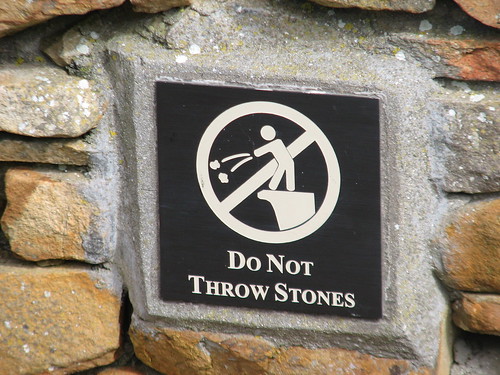
Illustrasjoner: Aschehoug, PostSecret, acunat, lorenia (Creative Commons)
Les også:
Posted by Julie at 5:01 PM | Comments (5) | TrackBack
December 6, 2010
Dagens blogger: jill/txt
Det er 6. desember, og vi bør lese bloggen jill/txt. Jeg skriver "vi" fordi jeg også burde lese mer av henne, det vil si Jill Walker Rettberg.
Hvorfor har ikke internett presentert meg for henne før? All logikk tilsier at jeg burde ha støtt på henne i en eller annen sammenheng: Hun har blogget siden 2000, mye om litteratur og digitale medier, som jeg nerder om, og på en blanding av norsk og engelsk, som meg. I tillegg har hun vokst opp i et engelskspråklig land, som meg. Og hun bruker (finner på?) begreper som digital multiculturalism. Jeg burde ha lest henne fast siden videregående. I stedet begynte jeg for noen dager siden, da jeg snublet over henne via Virrvarr (også en bra blogg selvsagt, men det er en annen historie). Jeg kunne selvsagt valgt å føle meg uvitende, men jeg velger å holde internett kollektivt ansvarlig for at jeg ikke har "møtt" denne bloggen før.
Jill blogger ikke så ofte for tiden, men nok til at nettsiden er langt fra død. Bloggen er dessuten et arkiv over fagfeltet digital litteratur. Det understreker forsåvidt poenget fra denne bloggposten: Twitter er kjempegøy, men det er samtidig et medium med irriterende kort hukommelse (overskriften her oppsummerer det uten å egentlig mene det).
Dessuten er det behagelig å lese om sosiale/digitale medier i en litterær sammenheng. Noen ganger blir jeg lei av å snakke om hvordan aviskonsern skal tjene penger i fremtiden eller hvordan bedrifter best kan fremstille seg selv i sosiale medier. Blogging og andre former for digitale medier handler også om å fortelle historier. Kanskje først og fremst om det.
Og hvis noen av mine kjære nerdevenner trenger et konkret bevis for at Jill Walker Rettberg bør leses: Hun har redigert en vitenskapelig antologi om World of Warcraft.
Blogg: jill/txt
Twitter: @jilltxt
Utvalgte innlegg
Jilltxt presenterer sin forskning i videoform
Teaching kids about censorware and privacy - inkl. omtale av Cory Doctorows Little Brother
Blogging about cancer - hvorfor så mange blogger handler om sykdom
Posted by Julie at 8:44 PM | TrackBack
December 5, 2010
Book list
Have you read more than 6 of these books? The BBC believes most people will have read only 6 of the 100 books listed here. Instructions: Copy this into your notes. Bold those books you’ve read in their entirety, italicise the ones you started but didn’t finish or read an excerpt. Tag other book nerds.
1 Pride and Prejudice - Jane Austen
2 The Lord of the Rings - JRR Tolkien
3 Jane Eyre - Charlotte Bronte
4 Harry Potter series - JK Rowling
5 To Kill a Mockingbird - Harper Lee
6 The Bible
7 Wuthering Heights - Emily Bronte
8 Nineteen Eighty Four - George Orwell
9 His Dark Materials - Philip Pullman
10 Great Expectations - Charles Dickens
11 Little Women - Louisa M Alcott
12 Tess of the D’Urbervilles - Thomas Hardy
13 Catch 22 - Joseph Heller
14 Complete Works of Shakespeare
15 Rebecca - Daphne Du Maurier
16 The Hobbit - JRR Tolkien
17 Birdsong - Sebastian Faulk
18 Catcher in the Rye - JD Salinger
19 The Time Traveller’s Wife - Audrey Niffenegger
20 Middlemarch - George Eliot
21 Gone With The Wind - Margaret Mitchell
22 The Great Gatsby - F Scott Fitzgerald
23 Bleak House - Charles Dickens
24 War and Peace - Leo Tolstoy
25 The Hitch Hiker’s Guide to the Galaxy - Douglas Adams
26 Brideshead Revisited - Evelyn Waugh
27 Crime and Punishment - Fyodor Dostoyevsky
28 Grapes of Wrath - John Steinbeck
29 Alice in Wonderland - Lewis Carroll
30 The Wind in the Willows - Kenneth Grahame
31 Anna Karenina - Leo Tolstoy
32 David Copperfield - Charles Dickens
33 Chronicles of Narnia - CS Lewis
34 Emma - Jane Austen
35 Persuasion - Jane Austen
36 The Lion, The Witch and The Wardrobe - CS Lewis
37 The Kite Runner - Khaled Hosseini
38 Captain Corelli’s Mandolin - Louis De Bernieres
39 Memoirs of a Geisha - Arthur Golden
40 Winnie the Pooh - AA Milne
41 Animal Farm - George Orwell
42 The Da Vinci Code - Dan Brown
43 One Hundred Years of Solitude - Gabriel Garcia Marquez
44 A Prayer for Owen Meany - John Irving
45 The Woman in White - Wilkie Collins
46 Anne of Green Gables - LM Montgomery
47 Far From The Madding Crowd - Thomas Hardy
48 The Handmaid’s Tale - Margaret Atwood
49 Lord of the Flies - William Golding
50 Atonement - Ian McEwan
51 Life of Pi - Yann Martel
52 Dune - Frank Herbert
53 Cold Comfort Farm - Stella Gibbons
54 Sense and Sensibility - Jane Austen
55 A Suitable Boy - Vikram Seth
56 The Shadow of the Wind - Carlos Ruiz Zifon
57 A Tale Of Two Cities - Charles Dickens
58 Brave New World - Aldous Huxley
59 The Curious Incident of the Dog in the Night-time - Mark Haddon
60 Love In The Time Of Cholera - Gabriel Garcia Marquez
61 Of Mice and Men - John Steinbeck
62 Lolita - Vladimir Nabokov
63 The Secret History - Donna Tartt
64 The Lovely Bones - Alice Sebold
65 Count of Monte Cristo - Alexandre Dumas
66 On The Road - Jack Kerouac
67 Jude the Obscure - Thomas Hardy
68 Bridget Jones’s Diary - Helen Fielding
69 Midnight’s Children - Salman Rushdie
70 Moby Dick - Herman Melville
71 Oliver Twist - Charles Dickens
72 Dracula - Bram Stoker
73 The Secret Garden - Frances Hodgson Burnett
74 Notes From A Small Island - Bill Bryson
75 Ulysses - James Joyce
76 The Inferno - Dante
77 Swallows and Amazons - Arthur Ransome
78 Germinal - Emile Zola
79 Vanity Fair - William Makepeace Thackeray
80 Possession - AS Byatt
81 A Christmas Carol - Charles Dickens
82 Cloud Atlas - David Mitchell
83 The Color Purple - Alice Walker
84 The Remains of the Day - Kazuo Ishiguro
85 Madame Bovary - Gustave Flaubert
86 A Fine Balance - Rohinton Mistry
87 Charlotte’s Web - EB White
88 The Five People You Meet In Heaven - Mitch Albom
89 Adventures of Sherlock Holmes - Sir Arthur Conan Doyle (reading it right now)
90 The Faraway Tree Collection - Enid Blyton
91 Heart of Darkness - Joseph Conrad
92 The Little Prince - Antoine De Saint-Exupery
93 The Wasp Factory - Iain Banks
94 Watership Down - Richard Adams
95 A Confederacy of Dunces - John Kennedy Toole
96 A Town Like Alice - Nevil Shute
97 The Three Musketeers - Alexandre Dumas
98 Hamlet - William Shakespeare
99 Charlie and the Chocolate Factoy - Roald Dahl
100 Les Miserables - Victor Hugo
Book nerds! What have you read?
Posted by Julie at 5:04 PM | Comments (1) | TrackBack
July 26, 2010
The secret city underneath Paris
To go underground and discover what lies buried beneath Paris, read this.
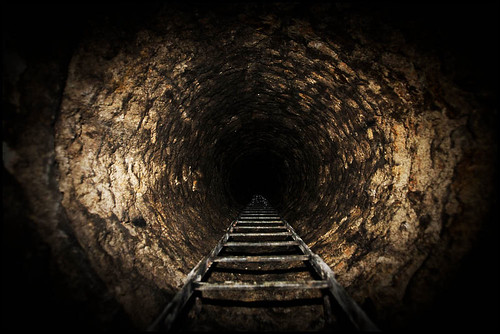
And then I'll tell you why I wanted you to do so...
I read The Lizard, the Catacombs, and the Clock: The Story of Paris’s Most Secret Underground Society because it was tweeted by Roger Ebert, so it was probably interesting. I had no idea what to expect, except that it would be about Paris and mysteries. Half way through I realized that I didn't even know if what I was reading was true. Was it journalism with literary influences or a short story meant to read like a feature article? It was published in a literary magazine, so was this fiction or non-fiction? I didn't care. I felt like I was reading a short novel. I wanted it to be a longer novel. I wanted someone to make it into a movie. I was imagining the trailer, with smoke drifting around Parisian street corners as members of a secret society emerge from potholes at 5 in the morning, holding hands. The layers of secrecy and confusion of art and reality reminded me of Siri Hustvedt's parallell universe. The journalist didn't know if the sources could be trusted, and as a reader, I didn't know if I could trust my narrator, but I was happy to go along with it all. I wanted to be tricked into believing that if I had just known the right people or taken the right wrong turn in the metro system, I would have discovered a dark and dusty Narnia. I wanted to believe - not know, believe - that there are people who secretly maintain the city of Paris from within.
"I have reached a dead end. Lanso’s secrets are tantalizing, but I can neither confirm nor deny them. UX’s deepest riddles cannot be Googled. The question I ask is, Do I believe them? And then I ask, Do I want to believe them? And then I know my answer."
Image: Zoriah, Creative Commons
Posted by Julie at 10:19 PM | Comments (2) | TrackBack
July 7, 2010
Library fantasies
With one exception (the glasses) the photo below could basically be me in my living room. The more books in a room, the happier I am. But lately I've been spending my free time packing my books into boxes. I'm moving soon, and it is highly unlikely that I will have room for my entire library in my next home. Sigh. In between sorting books into labeled cardboard boxes (Books I Absolutely Must Put On Shelf In Smaller Apartment, Books I Will Reluctantly Relocate To Parents' Attic, Utterly Useless PoliSci Textbooks Whose Pages Can Be Used To Wrap Coffee Cups, Books I Stole From Dad Years Ago, Books I Really Should Return To Ex/Acquintance/That Guy/Despicable Creature Who Absolutely Does Not Deserve Them, Books I Should Just Carry Around In Purses Until I've Read Them Again etc.), I've edited a magazine article about BookCrossing. It's by Marit Letnes, will be published in the next issue of argument, and (spoiler!) contains paragraphs like:
"Books are special objects, carriers of culture, not to be thrown away lightly. Destruction of books is often taboo, as if they have a spirit. They are not like other commodities: They should be given, not just sold."
Hardly the right sentences for me to be repeating over and over in my head when I should be thinking about letting go of my books.

So I fantasize about libraries. So does @nongenderous apparently. Her tumblr is full of library pictures. Read/dream on...
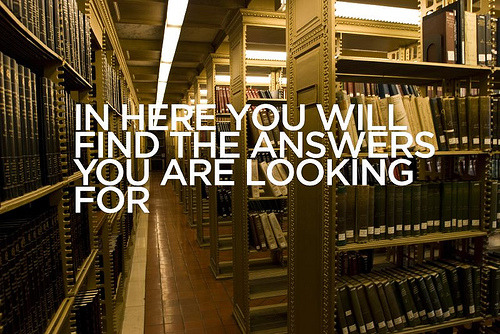
I love the feeling of promise that comes with a library.
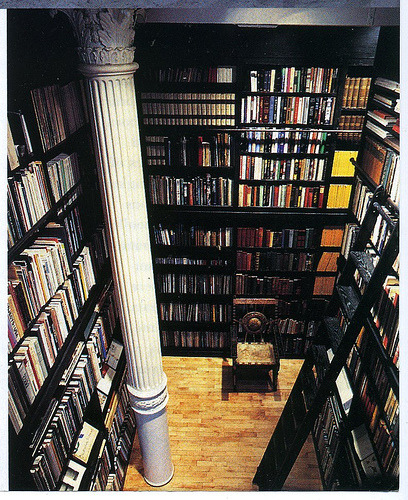
Aahh... No comment necessary. I could live here.

I could live here too, although it is a little too church-like. Who is the monk-like guy above the door? Where is this?

El Ateneo in Buenos Aires, a bookstore in a theater.

Nice. I have no idea where this is either.

Neil Gaiman's bookshelves. See more from his collection here.

The University of Copenhagen. One should consider the inspirational value of the university library when choosing a university. (Photo by Bo Madsen, I think)

Oh... wow. Biblioteca Joanina, at the University of Coimbra. Too bad I can't read Portugese. (My own university library wasn't ugly, but I probably should have gone to Copenhagen or Coimbra.)

In the process of moving, this is a more realistic idea of what my library looks like.
(All images via nongenderous. Original locations and photographers are usually lost on tumblr, but if you know where the photos are from, please let me know so I can credit and link appropriately. And visit the libraries of course.)
Posted by Julie at 11:32 PM | TrackBack
June 29, 2010
Generasjon Facebook - endelig en bok om meg!
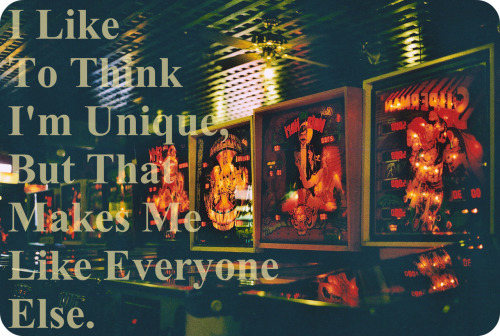
Jeg kunne umulig ha lest boken Generasjon Facebook eller Da alle skulle bli noe med media av Jon Niklas Rønning på et bedre tidspunkt enn nå. Nettopp ferdig med en journalistutdanning, fast bestemt på å bli noe med media, kjøpte jeg boken fordi jeg tenkte at jeg kunne blogge om den.
Jeg følte meg som hovedpersonen i Groundhog Day (Me, me, me also... I am really close on this one) da jeg leste beskrivelsene av hvordan "vi som vokste opp på 90-tallet" nå bor i bittesmå Oslo-leiligheter med litt for store prismelysekroner og drikker cortado på café mens vi diskuterer amerikansk politikk og våre egne skyhøye ambisjoner. Ja, jeg har oppdatert Facebook-profilen min for å fortelle at jeg er vÃ¥ken. Ja, jeg vet nøyaktig hva som kommer opp når man googler "Julie R. Andersen". Og når Rønning skriver "Det er merkelig hvor bekymringsløst man kan feste, dersom man føler man allerede har nådd selve livsmåletuot; eller "Hvorfor skjer det gang på gang - at vi på død og liv vil realisere de kreative sidene våre, men samtidig ikke setter av nok tid til å bli flinke?" eller "Du mangler inspirasjon, men skriver låter om det," tenker jeg: JA! Endelig har noen skrevet en bok om meg og alle jeg kjenner. I tilfelle jeg var i tvil, kunne Side2 bekrefte via en enkel test at selv om jeg strengt tatt er akkurat for ung til å skjønne 90-tallsreferansene, er jeg et medlem av Generasjon Facebook.
Mot slutten av boken står det: "Du vet du er en del av Generasjon Facebook når du irriterer deg over generaliseringer, og mener at du er mer unik enn stereotypiene som blir presentert i denne boka."
Den passet ikke. For de gangene det dukker opp generaliseringer jeg virkelig kjenner meg igjen i, blir jeg bare kjempeglad. Når jeg tar meg selv i å passe inn i en bås eller være en eller annen form for klisjé, er det underholdende, ikke flaut. Når jeg sitter på Café Sara med tre venninner og deler to flasker rødvin og én Klassekampen-artikkel om bibelreferansene i Tori Amos-tekster. Eller blir med på konsert med en liten gruppe nyutdannede designere og oppdager at vi alle matcher, fordi det er høsten 2009 og alle skal gå i mørkelilla og lysegrått. Eller retter på språket til foreleseren på Blindern og hører halve raden jeg sitter på hviske "den gang DA" i kor. Eller drar på "alternative" "indie" konserter med Regina Spektor eller Camera Obscura og blir overrasket over at halve klassen og alle jeg følger på Twitter også er der. Da tenker jeg "Nå er jeg så typisk _______(velg stereotyp selv)".
Det er egentlig rart at vi stadig får høre at vi skal være "oss selv", samtidig som vi alltid blir bedt om å beskrive oss selv ut fra hvilke båser vi passer inn i. De som vurderer å la meg bo i kollektivet sitt vil vite om jeg er A-menneske eller B-menneske, ryddig eller rotete, rolig eller ikke rolig. Jeg kan ikke svare på de spørsmålene. Det kommer an på.
Men jeg vet jo hvem jeg er, og jeg liker det når menneskene jeg møter er som meg. Ikke på alle punkter, men på mange punkter. Det er ikke fordi jeg er usikker eller trangsynt. Det er fordi jeg har opplevd å føle meg kjempespesiell og helt unik. Jeg har tenkt "ingen er som meg". Og det er ikke morsomt.
Har vi ikke alle vært der? Kanskje ikke, for jeg leser stadig intervjuer med folk som forteller at det er sykt viktig for dem å "være seg selv" og "skille seg ut". De som hele tiden må fortelle hvor spesielle de er, kan umulig være så spennende på ordentlig. Er du spesiell, kommer det frem uten at du trenger å bokstavere det.
Mitt slagord er kanskje det motsatte av det som står øverst i dette innlegget:
I like to think I'm like everyone else, but I guess that makes me unique.
Posted by Julie at 12:04 AM | TrackBack
May 19, 2010
Fashion lessons from childhood fiction
- Don’t be afraid of super high shoes. (Cruella de Vil)
- It’s not enough just to be pretty. (Jane Eyre)
- Well-tailored jackets and tiny Victorian-style boots go with everything. (Mary Poppins)
- There’s no shame in being different, bright jackets are awesome and you really need to stop judging people entirely by their clothing, even though judging people entirely by their clothing leads to completely accurate assumptions. Actually, every single item in your closet would look better surrounded by Parisian scenery... and judging people by their clothing is more accepted in Paris. (Madeline)
Via Jennifer Wright's series Fashion lessons from childhood fiction
Oh, and by the way, some related posts:
- Playing dress-up (how wanting to be a witch influenced my style)
- Dressed for anything (why Parisians judge)
- Style according to Julie (All my posts on clothes and fashion on one page)
(And yes, this was written as procrastination/break in the middle of writing a six page feature article on South African education. Yay, feature writing exams again!)
Posted by Julie at 9:55 PM | Comments (2) | TrackBack
January 15, 2010
Book review: The Big Questions
 In The Big Questions, Steven E. Landsburg uses math, economics and physics to discuss questions of philosophy, especially morality and ethics.
In The Big Questions, Steven E. Landsburg uses math, economics and physics to discuss questions of philosophy, especially morality and ethics.
That sounds a lot more serious than the book turned out to be. In fact, Landsburg ends the book by saying that most of it was written "not to make any particular point but because it seemed to fit and I think it's interesting."
It's a good introduction to some basic econ, math and physics, and to Landsburg's own beliefs and guidelines on life (including the reasoning behind them). Many of the examples and anecdotes were old news to me, because I have already taken courses in math, physics, economics and philosophy. But it's well-written, entertaining and easy to read.
Favorites:
* If more people really and truly believed in the religions they claim to follow, they would behave differently. For example, why don't we have more suicide bombers? Landsburg concludes that hardly anyone is actually religious:
"If religious belief were as widespread as people claim it is, there should be millions upon millions of voluntary martyrs. (...) Believers in hell should commit fewer crimes; believers in heaven should take more risks; believers in one religion should interact in predictable ways with believers in another; believers in God should have a powerful interest in the alternatives. Those implications are testable. I am moderately confident that carefully gathered statistics would refute the hypothesis that religious beliefs are widely or deeply held."
* If you want to write, study something you love and write about it. Do not take writing classes:
"If your writing is murky, it's usually because your thinking is murky, too. The cure for that is not a series of writing exercises; it's to master your subject matter. (...) Prose flows easily when you understand what you're saying. If you're struggling to 'craft' your prose, you're probably confused."
* The Economist's Golden Rule: Don't leave the world worse off than you found it OR Don't spend valuable time and energy in non-productive ways. It follows that you should not steal, counterfeit or be an Olympic athlete:
"If you bake a cupcake, the world has one more cupcake. (...) But if you win an Olympic gold medal, the world will not have one more Olympic gold medalist. It will just have you instead of someone else."
Right:
Wrong:

(Cupcake by Kuidaore)
Posted by Julie at 2:52 PM | Comments (1) | TrackBack
August 12, 2009
City of Thieves
I've always envied people who sleep easily. Their brains must be cleaner, the floorboards of the skull well swept, all the little monsters closed up in a steamer trunk at the foot of the bed.
I was born an insomniac and that's the way I'll die, wasting thousands of hours along the way, longing for unconsciousness, longing for a rubber mallet to crack me in the head, not so hard, not hard enough to do any damage, just a good wack to put me down for the night. But that night I didn't have the chance. I stared into the blackness until the blackness blurred into gray, until the ceiling above me began to take form and the light from the east dribbled in through the narrow barred window that existed after all.
Only then did I realize that I still had a German knife strapped to my calf.
That was the end of chapter 2* in City of Thieves by David Benioff. The insomniac is imprisoned in Leningrad during the Nazi siege. His crime was looting a dead German soldier. His punishment was supposed to be death, but instead he is sent on a special mission to find 12 eggs so that a Soviet colonel's daughter can have a traditional wedding cake. In a city where people are willing to eat books - or each other - finding eggs is completely impossible. But it's the only way he can survive.
I read ten chapters of this book last night, so I expect to finish it by Friday. It's fast-paced, sad, scary and somehow funny.
*I have added paragraph breaks.
Posted by Julie at 9:58 AM | TrackBack
June 29, 2009
A twist on the espresso and books combo
Espresso machines can also access thousands of titles that are in the public domain and available on the Internet.
The quote is from D. C. Denison writing for The Boston Globe. Imagine if my espresso machine* could also provide me with literary classics. The espresso machine in question, however, is the Espresso Book Machine. And while that invention isn't news to me, this particular article made me consider how great an EBM at one of my local bookstores would be.
Because I love bookstores, and I love Amazon, and I don't want to have to choose. Being able to spend time, lots of time, staring at the shelves of a physical bookstore and then deciding that in addition to the stack of paperbacks I'm buying, I'd like to get some "out of print" titles too... ah, that would be something.
*It works now, btw. The problem turned out to be so simple that I was a bit embarrased when one of my espresso machine guys pointed it to me. But I did write "I will gladly humiliate myself online for good coffee," so I won't complain.
Oh, and by the way:
Posted by Julie at 9:30 PM | TrackBack
May 30, 2009
This week
Links for the weekend - Things I've been thinking about while writing for work.

This week I recommend Think again: Child soldiers from Foreign Policy, a very thought-provoking article.
Also thought-provoking is The New Socialism from Wired, where Kevin Kelly writes that social media is the new socialism. I'm not entirely sure what to make of this. While both my inner politics geek and my inner web-media geek are very pleased, I'm not sure the arguments in this article are all that original or even true. At any rate, thoughts on the behavioral economics of blogging, twittering and youtubing are interesting. Specifically, it's hard to think that I'm blogging with a strictly rational-choice what's-in-it-for-me attitude. The idea of blogging to contribute to a community makes more sense. With me, I tend to blog what's in my head anyway; it's really not work that I selflessly do for your benefit. In Norway, there's a twist to this web socialism, as our Labor Party prime minister twitters. When he announced this on radio, he claimed he would follow everyone who followed him, because that's the Labor Party way ("Alle skal med!"). I don't know if he kept his promise though - is he following me?
 Speaking of social media, AudioBoo is the new thing, according to various sources, but I'm linking to The Guardian.
Speaking of social media, AudioBoo is the new thing, according to various sources, but I'm linking to The Guardian.
Going back to paper media, Dan Sabbagh at Times Online explains why the very snobby Monocle magazine is making money.
So it's not all doom and gloom: Global newspaper sales went UP in 2008.
But I still think paper is for art, not news. Examples to the left and above.
For Norwegian-speakers: B-mennesker er de nye A-mennesker fordi vi holder ut lenger.
This week I looked forward to Stuart Murdoch from Belle & Sebastian starting a girl group, God Help the Girl:
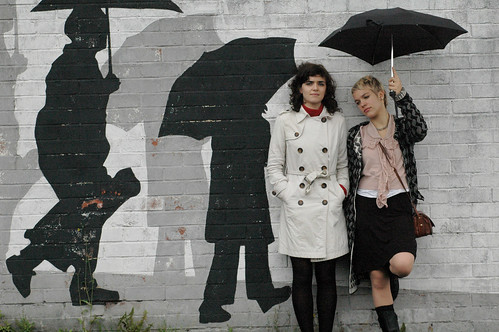
Although the dark-haired singer is clearly wearing my coat in this picture, I'm optimistic about this. I didn't love the first single (video), but I might in the near future. Individual Belle & Sebastian songs usually start out feeling anonymous, but then they grow on me.
This week I read The Enchantment of Lily Dahl by Siri Hustvedt.
 I recently renewed my subscription to Morgenbladet, but they keep calling me and sending me multiple postcards urging me to renew my subscription. They need to get their act together. Despite subscribing, I can't link to them, which is beyond annoying.
I recently renewed my subscription to Morgenbladet, but they keep calling me and sending me multiple postcards urging me to renew my subscription. They need to get their act together. Despite subscribing, I can't link to them, which is beyond annoying.
I added a new personal blog to my Bloglines: Thoughts and All
Also: I HAVE TICKETS TO SEE TORI!
Posted by Julie at 2:54 PM | Comments (2) | TrackBack
May 21, 2009
Emergency Sex
That's a book title I felt a little bit weird reading on the subway.
Emergency Sex (and other desperate measures) is the autobiographical story of UN workers Kenneth Cain, Heidi Postlewait and Andrew Thomson. The three friends, who take turns being narrator, met in Phnom Penh in 1990. They stayed in touch as they worked for the UN in Cambodia, Haiti, Rwanda, Liberia and Bosnia throughout the violent nineties.
"Andrew wanted to bind the wounds of innocent war victims, hoping to find grace. Heidi embraced the freedom-born-of-emergency determined to liberate herself and, in the process, as many women as she could touch. I planned to harness the power of an ascendant America to personally undo the Holocaust. Don't laugh. We were young." - Kenneth Cain, Brooklyn, New York, April 2003
I've always felt that since people have endured so much suffering, and others have had to witness peoples' suffering first-hand, the least I can do is read about it years later without giving up. But unfortunately - perhaps fortunately, as it's probably a sign of sanity - reading novel-length texts about torture, war, fear and despair is simply no fun.
With this book, however, I never considered giving up. It's fast-paced to the point of feeling like it's written for the screen, but more importantly, the characters are real people. It's a true story not just because it's non-fiction, but because it includes the narrators' mistakes, doubts, pre-peacekeeping past, parties - and yes, their hook-ups. They're journal-writers, not feature reporters. The lighthearted anecdotes are a necessary break from the sometimes disgusting descriptions of violence, but they also provide a backdrop that feels realistic to me: You clean up the mess after unspeakable terror by day, but when night falls, you still have crushes, friendships and a need to unwind and lead a kind of life.
Posted by Julie at 12:33 AM | TrackBack
May 4, 2009
Første dag i TU!
Og etter litt teknisk rot og mange nye fjes å huske på, fikk jeg til og med publisert noe. Nemlig en artikkel om mulighetene for avislesing med e-bokteknologi.
Jeg har etterhvert skrevet mye om e-bøker:
Posted by Julie at 10:03 PM | Comments (1) | TrackBack
Today weblogs, tomorrow booklogs
"(...) readers will stumble across books through a particularly well-linked quote on page 157, instead of an interesting cover on display at the bookstore."
Author Steven Johnson predicts booklogs, blogs that link to books, in a future with e-books.
Posted by Julie at 8:23 AM | Comments (1) | TrackBack
March 13, 2009
Nye venner fra Hustvedt
Bokanmeldelse av Siri Hustvedts The Sorrows of an American:
Da Inga fortalte Erik at Leo skulle komme på festen, måtte jeg ta en pause i lesingen. Jeg måtte minne meg selv på at Leo er hovedpersonen i Siri Hustvedts forrige roman. Han er ikke en virkelig person som det er naturlig at jeg skal savne eller være bekymret for. Likevel ble jeg lettet og glad da han dukket opp på fest i The Sorrows of an American (på norsk: Når du ser meg).
Det er kanskje det beste en romanforfatter kan gjøre: å skape figurer som leseren oppriktig tror på. Faktisk så mye at vi har lyst til å ringe dem for å forsikre oss om at de har det bra selv om forfatteren ikke har skrevet om dem på en stund. Hustvedt klarer det.
I The Sorrows of an American møter vi de norsk-amerikanske søsknene Inga og Erik. De er like nøyaktig skildret som Leo var i What I Loved (på norsk: Det jeg elsket) for fem år siden. Hustvedts nyeste bok er ikke en oppfølger til den forrige, men den foregår innenfor samme miljø i New York City. Den nye boken omfatter fire generasjoner, men handlingen går over bare ett år. Det er det året Inga kaller “the year of secrets”. The Sorrows... handler om alles hemmeligheter.
Erik er psykolog og forteller i første person. Sammen med Inga leter han etter sin avdøde fars hemmeligheter. Mysteriet om faren blir imidlertid stadig satt på pause mens Erik følger sidespor. Han vil også fortelle om sine pasienter, bøkene til søsterens døde ektemann og hvor opprørt hans niese er etter at hun opplevde 11. september 2001. Hustvedts komplekse og troverdige skikkelser kan ikke forstås uten sine drømmer, kunstverk, samtaler, doktorgrader og bøker. Derfor handler boken om mye mer enn den ytre handlingen. Mysteriet driver riktig nok handlingen fremover, men først og fremst distraherer det hovedpersonene fra deres egen ensomhet.
Det er fristende å lete etter bokens dypere mening: Er den en kommentar om norsk-amerikanere eller det amerikanske samfunnet? Tittelen forteller at det handler om spesielt amerikanske sorger. Hustvedt har brukt sin norske fars dagboknotater direkte i boken. Tanker om 11. september blandes med sanne historier om norsk-amerikanere under depresjonen. Psykologen Erik overanalyserer dessuten sin egen hverdag. Leseren kan dermed få et inntrykk av at naboens tegninger, søsterens drømmer og pasientenes klager er ledetråder i samme mysterium.
Det er imidlertid beskrivelser av personer som er Hustvedts store styrke. Jeg foretrekker derfor å lese boken som en god person- og miljøskildring, ikke en kommentar eller allegori. En tenåring må kunne være traumatisert av et møte med terrorisme uten at det nødvendigvis må leses som en kommentar til amerikansk utenrikspolitikk. Når Erik innlemmer norske ord i sitt språk, er det en del av hans kulturarv og personlighet. Jeg vil ikke lese det som et forsøk på å fortelle leseren noe universelt om norske innvandrere.
What I Loved er fortsatt Hustvedts beste roman. The Sorrows of an American føles litt uferdig. Mysteriene løses, slik at den ytre handlingen får en avslutning, men Erik holder fortsatt egne hemmeligheter fra leseren. Når karakterene bærer handlingen, savner jeg en mer kompleks utvikling hos fortelleren. Historien om psykologen som trenger psykolog har blitt fortalt før.
Samtidig er Eriks og Ingas ensomhet akkurat så sår som den skal være. Å lese boken er som å besøke en deprimert venn. Det gjør kanskje vondt, men man bryr seg nok til at man gjør det likevel.
Posted by Julie at 4:51 PM | TrackBack
March 3, 2009
Reuniting with Leo
With a mischevious smile, Inga raised her thumb and began to enumerate the guests, lifting a finger for each: "You and your mysterious Shakespeare heroine; Mamma, Sonia, me; Henry Morris, professor of American Literature, NYU, knew Max a little, recovering after painful divorce from mad Mary. He's a wee bit stiff, but very smart. In fact, I like him a lot. We've had a date." Inga winked at Erik, then thrust up the thumb of her other hand to keep on counting: "My friend Leo Hertzberg..."
For a moment, I stopped paying attention to their conversation: Leo Hertzberg? So Leo is alive...
Inga continued:
"Yet another professor, but a retired one, from art history at Columbia, lives on Greene Street, sees poorly, but he's very interesting and extremely kind. I met him from my friend Lazlo Finkman. I've been reading Pascal to him every week for an hour or so, and then we have tea. His great sadness is that his only child, a boy, died when he was eleven. Matthew's drawings are all over the apartment."
Definitely the same Leo Hertzberg. How does Inga know Lazlo? And more importantly: Is Leo all right?
I rummaged through my purse for my smallest notebook, but realized that I was only doing so to calm myself down. There was no need to make a note of this. I would not forget it.
I haven't heard from Leo in years, and today I realized how worried I have been. I haven't tried to contact him, because I'm not crazy: I know Leo isn't real.
It might just be a novelist's greatest possible achievement: to create characters so believable that the reader desperately wants to call them to make sure they're ok and then to invite them over for wine and conversation. With What I Loved, where I first met Leo and his friends, and now with The Sorrows of an American, which makes me want to call Erik and tell him I'm lonely too, Siri Hustvedt does just that. She creates a complete, alternate world of her characters.
And so today I took a tram through Oslo and ended up in a loft in New York City, preparing for a party with Erik and his sister Inga. And my old friend Leo was on the guest list.
The first and fourth paragraph of this text were written by Siri Hustvedt in The Sorrows of an American. I have copied them, changed one word (Erik was originally I) and included them here to illustrate the experience of stepping into a novel's alternate reality.
Related post for Norwegian readers: Review of The Sorrows of an American
Posted by Julie at 9:23 PM | Comments (2) | TrackBack
February 26, 2009
Love in a Headscarf
I usually don't enjoy what The Guardian calls chick lit. That stuff is better in the movies, where you can concentrate on the shoes and hair and bags when the storyline becomes too silly. But I might want to read Love in a Headscarf, Shelina Zahra Janmohamed's "chick-lit memoir of her arranged marriage" - just out of curiousity.
Some quotes from the comment thread of The Guardian's article:
What strikes me is the way she describes the process in purely material terms. She 'judges' potential husbands on their looks, time-keeping and financial generocity to herself. No mention of personality, interests or compatibility. Is that what it's about?
Bridget jones didn't claim to speak or represent each and every 30-year old who happened to be single
Nor does Shelina attempt to do the same for Muslim women. It's just a story of how she finds love - why is it that as a minority writer, she suddenly is expected to carry the burden of representing each and every muslim woman in the world?
Those Muslim women living in the West who are making a free choice to act publicly like second-class citizens (in relation to men) must accept that their actions and beliefs are profoundly threatening to Western women, who are still fighting a long battle not to be second-class citizens.
Posted by Julie at 11:07 AM | Comments (2) | TrackBack
February 23, 2009
Hvordan ikke bli skrevet om på nett
Via intern-nettsiden til Høgskolen i Oslo finner jeg ut at det skal være "morgenbokbad" med lansering av en ny bok om nettskriving. Ove Dalen har skrevet "Effektiv nettskriving", og den lanseres på min skole! Fint! Det står så mye rart om nettskriving i journalistikkstudentenes pensum, så dette var på tide! Jeg skal SÅ på bokbad, og jeg skal SÅ blogge.
Eller ikke.
Arrangementet er fullt, og det ville uansett kostet meg 300 kr å komme inn.
300 kr for å få 10 % rabatt på en bok til 398? Ja, det er tydeligvis noen som synes det er en god deal.
Posted by Julie at 11:43 PM | Comments (1) | TrackBack
February 17, 2009
E-bokdebatt på Blå
Etter debatt om e-bøker på Blå i kveld, lurer jeg på om jeg ønsker meg en Kindle.
Jeg legger ut mine egne notater, men med et slags forbehold: Dette er ikke et fullstendig referat. Jeg var egentlig på debatten fordi jeg jobber med en sak om finansiering av nettaviser, og det forklarer hvorfor bloggeren Størmer og Aftenpostens Bjørkeng får mer spalteplass her i bloggen enn forfatteren Oterholm og Gyldendals Buset.
Skulle noen føle seg feilsitert, oppfordrer jeg til protester i kommentarfeltet.
Forøvrig ble visst arrangementet liveblogget.
Les også Paul Chaffey om samme tema, og alt han linker til, spesielt Eirik Newth og The Economist.
Før Kindle, skrev jeg selv om bøker på papir og skjerm.
- Bjarne Buset (informasjonssjef Gyldendal og selger sin bok via Mobipocket)
- Anne Oterholm (forfatter og leder Forfatterforeningen).
- Per Kristian Bjørkeng (journalist Aftenposten).
- Carl Størmer (blogger - www.carlstormer.com og Kindlebruker).
Størmer:
- Mange sier de liker papir, men man kan alltid ha litt papir i lomma.
Han trekker en parallell til hester og biler: man kan like lukten av hest, men det betyr ikke at man ikke kjører bil når man skal fra a til b.
Endring i forretningsmodellene er viktige, fordi denne teknologien potensielt kan endre maktforholdene i forlag. Det kan være andre mennesker som tjener penger. Amazon tilbyr for eksempel direkte publisering.
En forretningsmodell er:
-
verdiskapning
-
å ta betalt for verdien
-
å kunne beskytte seg
Bjørkeng:
Den gjennomsnittlige Kindlebruker kjøper 2,6 ganger flere bøker enn før de kjøpte Kindle. Kindle gjør hva som helst for å gjøre det enkelt å kjøpe bøker. Den er en bokhandel i seg selv. Man kan lese avisen – papirutgaven selvsagt :-) – og finne en anmeldelse, og så kan man med en gang kjøpe bøken på Kindle fra hvor som helst (i USA, i dag kan man ikke laste ned bøker til Kindle hvor som helst i Norge, fordi det ikke finnes noen avtale for boknedlasting over norske mobilnett til Kindle). Det er lavere pris enn i bokhandelen med ca. 60 %. Amazon har klart å knekke koden. Storleserne kjøper. Hvis man leser en bok i året, lønner ikke Kindle seg, men hvis man leser en bok i uken, sparer man mye. Piratkopiering kommer til å bli et stort problem.
Bjørkeng med irex, et alternativ til Kindle som finnes i Norge.
Buset:
Vi i Gyldendal gleder oss, og jeg kommer ikke til å la meg provosere i denne debatten. Internett kan kortslutte verdikjeden til forlagene ved å kutte ut mellomleddene. Forlagenes rolle blir annerledes. Blir det mulig å være forfatter hvis alt skal være gratis? For leserne blir det en himmel. Bær med deg hele verdens bibliotek. Bøkene blir aldri utsolgt. Riktig nok er det mye av verdenslitteraturen som allerede er gratis tilgjengelig på nettet. For en viss type bøker vil ikke papir forsvinne. Trenger vi bokhandelen som et sted? Det blir kanskje som fotballstadion før og etter tv. En stund tømtes fotballstadionene, men så fant man ut at man gikk glipp av noe sosialt ved å bare se fotball hjemme.
Fastpris bremser e-boken i Norge. Jeg har skrevet fem T-er som e-boken trenger:
Teknologi – en kul dings, folk faller for elektronisk blekk
Tilgjengelighet
Titler
Tilbud – en god pris
Trygghet – et “sted” der teksten er
De fem T-ene er forent i Kindle.
Hva gjør dere i dag for å møte den nye teknologien?
Foreløpig bremser vi. Det eneste fornuftige er for forlagene å samarbeide og bli enige om en digital distribusjonskanal. Da har vi en felles standard, og vi kan sørge for at verdiskapningen forblir i bransjen, ikke flytter seg ut. Vi håper en slik løsning kommer innen årets slutt.
Oterholm:
Min 16-år gamle sønn laster ikke piratkopierte bøker, fordi det er ingen han kjenner som leser. Jeg tror e-bokens lesere er interesserte i å samarbeide med forfatterne og forlagene. Derfor trenger vi ikke å ha piggtråd rundt årsverkene – altså kopibeskyttelse.
Bjørkeng:
DRM rammer først og fremst den lovlydige brukeren. Det er derfor musikkbransjen har gått bort fra det. PDF med vannmerke (som kan fjernes, slik Buset gjorde da han begynte å laste ned norske e-bøker.) innebærer at du eier filene (i motsetning til DRM, der du bare kan bruke filene innenfor bestemt teknologi.)
Størmer:
MP3 konkurrerer langs en annen akse enn CD. Vi er låst i gamle forretningsmodeller. Spotify for eksempel, tilbyr streaming. Det blir omtrent som å kjøpe strøm. Det er tre spørsmål:
-
Når skjer ting? Her er det lett å ta feil, fordi bruken av denne teknologien vokser eksponensielt.
-
Hva skjer?
-
Hvordan påvirker det oss?
Det oppsummerte svaret er at noen kommer til å skrive, noen kommer til å bearbeide, noen kommer til å fortelle at teksten finnes (markedsføre) og noen kommer til å distribuere. Men det er ikke nødvendigvis de samme aktørene som i dag.
Forlagene må kanskje kannbalisere. Det vil si å prøve nye forretningsmodeller selv om man taper penger på kort sikt. Å bryte egne mentale modeller er den store utfordringen i innovasjon. Vi er fanger fordi vi er optimalisert etter vår egen modell. Du må ha råd og tid til å innovere og eventuelt feile, og det har du ikke hvis du er optimalisert. Da kan det legges piggtråd mellom kjøper og selger, for å bruke Oterholms bilde.
Buset:
Jeg er en varm tilhenger av DRM. Det stemmer ikke at musikkbransjen “skjønte det” nå. Musikkbransjen hadde uflaks. Forlagsbransjen er heldig fordi det er vanskeligere å kopiere1 og fordi vi har mer konservative kunder. Det ligger en viktig symbolverdi i at forfattere skal kunne si at de eier noe.
Fastprisavtalen?
Bjørkeng:
Fastprisavtalen er bokbransjens verste fiende. Vi må ha forlag og forfattere, men 70 % av bokprisen i dag går til distribusjon. I bakgrunnen lurer The Pirate Bay. Det stemmer ikke at musikk er det letteste å kopiere. Bøker er det letteste å kopiere. Bøker er så små (i filstørrelse). Alle moderne engelskspråklige bestselgere kan distribueres i én fil. Jo før forlagene forstår dette og prøver å lage et godt system, jo mindre taper de til piratene.
Oterholm:
Teknologi som Kindle og andre e-boklesere kan gjøre det lettere å kjøper bøker i den lange halen. Det som vil koste penger er at noen må fortelle om bøkene i den lange halen (markedsføring).
Størmer:
Av dere som sitter i panelet med meg, tror jeg bare det er Oterholm som overlever denne teknologiutviklingen. “Vi har lagd utstyret til hester, klart vi skal lage bildeler” – den tankegangen fungerte ikke da, og det er ikke sånn det fungerer nå. Forlagene har ingen merkevare! Tenk hva dette kan gjøre for fagbøker, hvis man for eksempel kan kjøpe dem kapittelvis. Gode redaktører vil det fortsatt være bruk for. I dag tjener de luselønninger i Norge, men de kommer ikke til å forsvinne.
Buset:
Jeg skal som sagt ikke bli “trukket opp” i dag. Hvis forlagene forsvinner, så får de gjøre det.
Om fastpris: Vi skal i hvert fall ikke ha en situasjon der e-bøker koster 399,- og konkurrerer med papirutgaver som koster det samme.
Spørsmål fra salen begynner. Resten av kommentarene mine er bare sporadiske punkter som jeg syntes var spesielt interessante:
Første spørsmål er om hvordan boken vil se ut i fremtiden: Vil den inneholde musikk? Video? Linker til ordforklaringer og bakgrunnsinformasjon?
Buset:
Var det en jobbsøknad? Jeg tror du har svart på ditt eget spørsmål. JA!
Størmer:
Kindle er en uforstyrret leseropplevelse. Alle snakker om hot spots, men jeg er like opptatt av å finne cold spots – selv om den allerede har innebygget ordbok og linker til wikipedia.
Størmer med sin Kindle.
Bjørkeng:
Elektronisk blekk kan ikke vise farger. Dessuten vil man, når man leser en roman, leve seg inn i forfatterens verden. Men wikilinker i fagboker bør bli en vinner.
Bare vent til Blindern skal velge mellom å bruke 4000,- på mange kilo pensum eller piratkopiere pensum.
I dag er bøker kontrollert av tykkelse på selve boken som gjenstand. Hva om leseren betaler etter time? Kan bøker bli lengre?
Morten Jørgensen, forfatter (mer kommentar enn spørsmål):
Min neste roman er med linker.
Jeg er villig til å vedde på at amerikansk bokbransje kontrollerer den norske innen 10 år slik forlagene holder på nå.
Det er ikke snakk om at papirboken dør eller lever. Vinyl lever jo fortsatt, og Director's Cut filmer lever som dvder selv om folk laster ned filmer. Men trærne kan glede seg over at papirboken solgt i det omfanget den er i dag, dør.
Bokbransjen lever på kjempedyre lærebøker – få det vekk!
Fildeling for Afrika! Gi Asia og Afrika gratis fildeling nå! Hev spørsmålene opp på et politisk plan. Eller la alle som betaler for bredbånd gi 50 ekstra kroner og fordel blant forfattere og forlage i ettertid.
Buset:
Gutenberg gjorde det så lett å kopiere at man måtte oppfinne opphavsretten for å lage incitament til å skape noe i det hele tatt.
Størmer:
Innovasjoner kommer der etablerte aktører ikke tjener penger. Bloggere er eksempler på skriveføre som kan tjene penger selv.
Kommentarer/spørsmål fra salen:
Forslag til forretningsmodell for forlag: De kan drive med oversettelse, signeringsturnéer og salg av prakteksemplarer.
Størmer:
Det vil alltid være en som leser. Det vil alltid være en som skriver. Det i midten forandrer seg.
Få hele verden som leser – skriv på engelsk!
Reklame i litteraturen er kanskje en løsning? :-)
Bøkene jeg er glad i, vil jeg i hvert fall ikke ha på papir. De vil jeg ha på Kindle, slik at jeg alltid har dem med meg.
1Nå ble jeg plutselig usikker på om det var det han sa, fordi det høres ikke logisk ut. Sannsynligvis mener han papirbøker. Før teksten er digitalisert, er den vanskelig å piratkopiere. Så vidt jeg husker, nevnte også Buset at "papirboken som fysisk gjenstand er kanskje den mest effektive kopisperren vi har". Med en gang teksten er digital, er den imidlertid fantastisk lett å kopiere. Ctrl C + Ctrl V.
Posted by Julie at 11:32 PM | Comments (6) | TrackBack
January 12, 2009
Novels of 2008
Some novels I read and enjoyed in the past year - more info on each one later.
On Beauty by Zadie Smith
The Book Thief by Markus Zusak
Les Misérables by Victor Hugo (read it here)
If On a Winter's Night a Traveller by Italo Calvino
Middlesex by Jeffrey Eugenides
Life of Pi by Yann Martel
The Amazing Adventures of Kavalier and Clay by Michael Chabon
Brideshead Revisited by Evelyn Waugh
(Looking at the list, I'm struck by the authors' interesting names. I need to change mine, I think.)
Posted by Julie at 11:28 PM | Comments (2) | TrackBack
December 15, 2008
Anne-Cath. Vestly
The first thing that happened to me today was that I found out that Anne-Cath. Vestly is dead. She was a Norwegian author of children's books. As far as my childhood was concerned, she was the only Norwegian author of children's books.
I grew up making way for ducklings, scared and fascinated by robbers, and best friends with Anne Shirley. I generally preferred my fiction to take me to someplace long ago and far away - there was enough realism in the real world.
Norway, my home country, was long ago and far away. Except for summer (vacation, so not real life) and my parents' memories (long ago, and they were grown-ups), it was far more distant than Prince Edward Island and the Boston Public Garden.
I can't think of any other Norwegian author who meant more to me. Because, even though I didn't think about this at the time, looking back, Vestly's fiction was a window into what growing up "back home" was like.
And I'm glad that I pictured Norway the way she did. I'm glad that in Norway, families with eight children lived in one-room apartments in Oslo and still took care of their mormor* who was afraid of taking the tram through town. And that a little girl who played the violin had no father and a mother who worked as a janitor in their apartment building. And that in the same apartment building, another little girl's father stayed at home studying and eventually defending his doctoral dissertation while her mother worked as a lawyer. Although she caused controversy, Vestly's books never seemed overly political. They just told the truth about how children live and think.
The week before Vestly died, I talked about her with my family. Just this Saturday, some of her characters came up in a conversation with my best friend. Today, friends are grieving for "the end of their childhood" in Facebook statuses. I know we'll all read her books to our children.
Links
- Wikipedia in English on Anne-Cath. Vestly
- Another English-language post about Anne-Cath. Vestly
- My dad's post about her, in Norwegian
Related posts
- Well, it's over
- Books I read too early
- Just read!
- Svar på boksspørsmål (my first blog post ever was about books, in Norwegian)
* Mormor = mother's mother, grandmother
Posted by Julie at 11:22 PM | TrackBack
November 23, 2008
Middlesex
I read Middlesex earlier this fall, and now I think the author Jeffrey Eugenides could tell me any kind of story and I would love it. I won't go into detail when it comes to plot. The Amazon review basically sums up my own thoughts on the book - including the sadness I felt when it was almost over. So here is an excerpt.
Desdemona had found Lefty on our kitchen floor, lying next to his overturned coffee cup. She knelt beside him and pressed her ear to his chest. When she heard no heartbeat, she cried out his name. Her wail echoed off the kitchen's hard surfaces: the toaster, the oven, the refrigerator. Finally she collapsed against his chest. In the silence that followed, however, Desdemona felt a strange emotion rising inside her. It spread in the space between her panic and grief. It was like a gas inflating her. Soon her eyes snapped open as she recognized the emotion: it was happiness. Tears were running down her face, she was already berating God for taking her husband from her, but on the other side of these proper emotions was an altogether improper relief. This was it: the worst thing. For the first time in her life my grandmother had nothing to worry about.
Emotions, in my experience, aren't covered in single words. I don't believe in "sadness", "joy," or "regret." Maybe the best proof that the language is patriarchal is that it oversimplifies feeling. I'd like to have at my disposal complicated hybrid emotions, Germanic train-car constructions like, say, "the happiness that attends disaster." Or: "the disappointment of sleeping with one's fantasy." I'd like to show how "intimations of mortality brought on by aging family members" connects with "the hatred of mirrors that begins in middle age." I'd like to have a word for "the sadness inspired by failing restaurants" as well as for "the excitement of getting a room with a minibar." I've never had the right words to describe my life, and now that I've entered the story, I need them more than ever. I can't just sit back and watch from a distance anymore. From here on in, everything I'll tell you is colored by subjective experience of being part of events.
From Middlesex by Jeffrey Eugenides, (pages 216-217 in the 2003 Bloomsbury paperback edition)
Posted by Julie at 12:44 PM | TrackBack
July 23, 2008
Pia Haraldsen feil - Del 2

"Your manuscript is both good and original. But the part that is good is not original, and the part that is original is not good." Samuel Johnson sa visst aldri dette, men jeg sier det nå. Det beskriver nemlig boken Pias Bekjennelser så godt. Jeg lovet en anmeldelse, og her er den...
La meg presisere et par ting. For det første, denne boken forandret mitt liv. Jeg ble nemlig solbrent, og senere ble jeg faktisk brun. Det skjer ikke. For det andre, mitt førsteinntrykk av Pia Haraldsen var positivt. Jeg satt og irriterte meg over hvor grå alle gjestene i Ingrid Alexandras barnedåp så ut, da hun dukket opp og smilte selvsikkert til fotografene. Skal du gå på en rød løper, skal du gjøre det skikkelig. Du skal ikke se ned i bakken med lutede skuldre som om du intenst ønsker deg vekk. Ja, slike kjendiser som er kjent for å være kjendiser er litt irriterende, men jeg lar meg likevel imponere av at hun har fått det til, og at hun gjør alt hun gjør med stil - selv om rosa minikjole og Hello Kitty smykke ikke er min stil.
Å slakte en bok med rosa glitterforside for at den inneholder "overfladiske" ting som skjønnhetstips, blir for latterlig. I motsetning til Vendelas "Beauty Bible", inneholder denne boken råd mange har godt av å få med seg. For Pia har helt rett i at alle bør kle seg etter sin egen figur og stil, ikke etter ukens trender. Og ikke minst at jenter som hele tiden snakker om at de har stygge lår, etter hvert vil være kjent for sine stygge lår, om ikke annet fordi det er det eneste de snakker om. Det er denne selvsikkerheten som gjør deler av "Pias Bekjennelser" gode. Dette er jo ting jeg selv har blogget om, og som jeg nesten hver dag prøver å tankeoverføre til tyske og amerikanske turistdamer. Med andre ord: det er ikke spesielt originalt.
Og med en gang det blir originalt, blir det også fryktelig dårlig. Ikke bare kjedelig, men også provoserende og raserifremkallende - og den kombinasjonen er sjelden. For i bokens siste halvdel, får vi svaret på "Hva slags fraser kan du lire av deg om både kunstverk og utenrikspolitikk og få det til å høres troverdig ut?" Eller: hvordan lure Jonas Gahr Støre til å tro at man bryr seg.
For det er klart man ikke bryr seg. Pia skriver rett ut at det eneste interessante med utenrikspolitikk er Jonas og Barack, men at man likevel bør unngå å snakke om sminke og kjendiser hele tiden - selv om det selvsagt er det man helst vil. Man er jo jente! Da forstår man ikke før man har lest det med rosa skrift: at man skal følge med på scenen når man er på teater, og at det kan lønne seg å "lese en kronikk i ny og ne". Dette er nøyaktig like nedverdigende som tanken på at kvinner skal utdanne seg kun for å møte velutdannede menn.
I de fleste mote- og skjønnhetsblader består første halvdel av retusjerte bilder av modeller med kropper som 13-årige gutter og siste halvdel av artikler om hvor viktig det er å vise "ekte kvinner" i motereportasjer. I Pias bok handler første halvdel om å være seg selv, andre halvdel om at vi alle er helt like, men at vi heldgvis kan lure menn til å tro noe annet. Og det minner meg om et annet artig sitat, nemlig Dorothy Parkers "You can lead a whore to culture, but you can't make her think."
Misforstå meg ikke. Det er ikke horete å innse at folk kan være overfladiske, å ta konsekvensen av denne innsikten og så prøve å nå så langt man bare kan. Men er man så smart som jeg tror Pia Haraldsen egentlig er, skal man holde seg for god til å oppfordre til dumhet. Spesielt hvis man ønsker å bli husket som noe annet enn "sminkedokka fra Snarøya" - som hun faktisk påpeker at hun er blitt (feilaktig!) anklaget for å være. Jeg har derfor to ting å si til denne bokens lesere:
Hvis sko er like viktig som utenrikspolitikk, hvorfor skal man late som om man er mer opptatt av utenrikspolitikk enn sko? Dersom du pugger "Pias Bekjennelser" for å ha noe interessant å si til en date, fortjener du ikke at den daten har noe til felles med Jonas Gahr Støre (og dette sier jeg som en Interjente som har drukket kaffe med fremtidens Jonaser).

Posted by Julie at 10:52 AM | TrackBack
July 8, 2008
Pia Haraldsens feil
Min Facebook status: Julie er solbrent (og skylder på Pia Haraldsen.)
Hvorfor? Jeg leste hele boken til Pia Haraldsen mens jeg lå på en flytebrygge utenfor Malmøya. Det tok ikke veldig lang tid å komme gjennom den boken, men lang nok tid til at jeg burde hatt mer/sterkere solkrem. Bikinien min matchet forsiden. I ettertid matchet huden min rammen på forsiden.
Ja, men hvorfor gjorde du DET da? Pia Haraldsens bok var årsak til en liten slåsskamp diskusjon ved en middag hos familien min for noen måneder siden. Min far og jeg hadde begge lest om den i Morgenbladet, og vi var skeptiske. Min mor og en av mine søstre forsvarte boken. Ingen av oss hadde lest den på dette tidspunktet, men da den viste seg å være i mine foreldres hus da jeg besøkte dem på en fridag, måtte jeg bare finne ut hvem av oss som hadde rett.
Og hvem hadde rett? Vel...
Posted by Julie at 12:53 AM | Comments (4) | TrackBack
October 11, 2007
First sentence
I "Searched inside" The Myth of the Rational Voter by Bryan Caplan at Amazon.com. This is the first sentence:
What voters don't know would fill a university library.
Well, I certainly hope so. If you can't fill a university library with stuff people don't know yet, what's the point?
Posted by Julie at 10:09 PM | TrackBack
August 26, 2007
This week
- Cooking by numbers which gives you possible recipes after you've given them a list of what's in your kitchen. I could at least make "an apple on its own" using the following recipe: 1. Take apple and examine for signs of wear and tear. 2. Put your coat on and go down the local shop or supermarket. 3. Whilst walking chew on your apple. Stop eating when you get to the pips and stalk. Throw the stalk in the bin and get some food.
- "The only thing that interferes with my learning is my education." and other Einstein quotes
- Why Can't I Own Canadians?
- Info bare for de sterke "Paradoksalt nok finner Google frem til relevant informasjon på norge.no mye raskere og enklere enn dersom brukeren selv skal navigere seg frem på norge.no," skriver informasjonsrådgiver Knut Natvig. Statens nettsider er for dårlige.
- Hasj er farlig Så det så. Men det forbindes fortsatt med "politisk motkultur og høy utdanning" og nesten halve Oslo prøver det innen de fyller 30.
- The Complete Polysyllabic Spree by Nick Hornby. It makes me very happy. So much so that I don't want to pick just a few things to say about it. I'll either have to give it its own blog post, or just tell you to read it for yourself. You can read the introduction here.
I watched
- Middle East History I can't help but think while watching this: The area we call the Middle East (and maybe especially Isreal) has been controlled by so many different empires that if having once controlled a territory sometime in history gives you rights to controlling it now, then ANYONE can claim these areas. Shouldn't this be obvious to anyone using that kind of argumentation? It can apparantly be explained in 90 seconds.
- Olsenbanden Fordi jeg ikke fikk lov til å gå glipp av denne viktige siden av norsk kultur (etter et dansk konsept riktig nok).
- Pan's Labyrinth According to Kermode: "If you're only going to see one movie this year, first of all what's wrong with you? And secondly, it should be Pan's Labyrinth." And I loved it. After all, it's Narnia for grown-ups, with history, fantasy, seriously scary monsters, and a lead actress who does a great job.
I listened to
- Kermode. Well, actually I always do, but I haven't written about him yet. He is fantastic, especially when he really dislikes a movie and rants. I wish he would do that for more than just movies. I wish there were Kermode podcasts for books, politicians, newspaper articles, buses, exam grades, friends, family members, random acquantances and shoe prices.
Posted by Julie at 10:38 AM | Comments (4) | TrackBack
August 23, 2007
Future wish
"Hey, great idea: if you have kids, give your partner reading vouchers for Christmas. Each voucher entitles the bearer to two hours' reading time while the kids are awake. It might look like a cheapskate present, but parents will appreciate that it costs more in real terms than a Lamborghini."
I must remember this in the future.
Quote from the fantastic Polysyllabic Spree by Nick Hornby.
Posted by Julie at 8:46 AM | TrackBack
August 13, 2007
Advice from Hemingway
Advice I intend to follow, from Hemingway. I suppose I could call him one of my heroes, although I generally make a point of not having those.
On Writing:
If a writer knows enough about what he is writing about, he may omit things that he knows. The dignity of movement of an iceberg is due to only one ninth of it being above water.
My aim is to put down on paper what I see and what I feel in the best and simplest way.
When writing a novel a writer should create living people; people not characters. A character is a caricature.
On Life:
Always do sober what you said you'd do drunk. That will teach you to keep your mouth shut.
Never go on trips with anyone you do not love.
Biography beneath the fold. (This is an abridged version of the text you can find here, but it's still very long for a blog post. The highlighting is from when I studied Hemingway in high school.)
At the time of Hemingway's graduation from High School, World War I was raging in Europe. The United States joined the Allies in the fight against Germany and Austria in April, 1917. When Hemingway turned eighteen he tried to enlist in the army, but was deferred because of poor vision. When he heard the Red Cross was taking volunteers as ambulance drivers he quickly signed up. He was accepted in December of 1917, left his job at the paper in April of 1918, and sailed for Europe in May. In the short time that Hemingway worked for the Kansas City Star he learned some stylistic lessons that would later influence his fiction. The newspaper advocated short sentences, short paragraphs, active verbs, authenticity, compression, clarity and immediacy. Hemingway later said: "Those were the best rules I ever learned for the business of writing. I've never forgotten them."
Hemingway first went to Paris upon reaching Europe, then traveled to Milan in early June after receiving his orders. The day he arrived, a munitions factory exploded and he had to carry mutilated bodies and body parts to a makeshift morgue; it was an immediate and powerful initiation into the horrors of war. Two days later he was sent to an ambulance unit in the town of Schio, where he worked driving ambulances. On July 8, 1918, only a few weeks after arriving, Hemingway was seriously wounded by fragments from an Austrian mortar shell which had landed just a few feet away. At the time, Hemingway was distributing chocolate and cigarettes to Italian soldiers in the trenches near the front lines. The explosion knocked Hemingway unconscious, killed an Italian soldier and blew the legs off another. What happened next has been debated for some time. In a letter to Hemingway's father, Ted Brumback, one of Ernest's fellow ambulance drivers, wrote that despite over 200 pieces of shrapnel being lodged in Hemingway's legs he still managed to carry another wounded soldier back to the first aid station; along the way he was hit in the legs by several machine gun bullets. Whether he carried the wounded soldier or not, doesn't diminish Hemingway's sacrifice. He was awarded the Italian Silver Medal for Valor with the official Italian citation reading: "Gravely wounded by numerous pieces of shrapnel from an enemy shell, with an admirable spirit of brotherhood, before taking care of himself, he rendered generous assistance to the Italian soldiers more seriously wounded by the same explosion and did not allow himself to be carried elsewhere until after they had been evacuated." Hemingway described his injuries to a friend of his: "There was one of those big noises you sometimes hear at the front. I died then. I felt my soul or something coming right out of my body, like you'd pull a silk handkerchief out of a pocket by one corner. It flew all around and then came back and went in again and I wasn't dead any more."
Hemingway's wounding along the Piave River in Italy and his subsequent recovery at a hospital in Milan, including the relationship with his nurse Agnes von Kurowsky, all inspired his great novel A Farewell To Arms.
When Hemingway returned home from Italy in January of 1919 he found Oak Park dull compared to the adventures of war, the beauty of foreign lands and the romance of an older woman, Agnes von Kurowsky. He was nineteen years old and only a year and a half removed from high school, but the war had matured him beyond his years. Living with his parents, who never quite appreciated what their son had been through, was difficult. Soon after his homecoming they began to question his future, began to pressure him to find work or to further his education, but Hemingway couldn't seem to muster interest in anything.
He had received some $1,000 dollars in insurance payments for his war wounds, which allowed him to avoid work for nearly a year. He lived at his parent’s house and spent his time at the library or at home reading. He spoke to small civic organizations about his war exploits and was often seen in his Red Cross uniform, walking about town. For a time though, Hemingway questioned his role as a war hero, and when asked to tell of his experiences he often exaggerated to satisfy his audience. Hemingway's story "Soldier's Home" conveys his feelings of frustration and shame upon returning home to a town and to parents who still had a romantic notion of war and who didn't understand the psychological impact the war had had on their son.
The last speaking engagement the young Hemingway took was at the Petoskey (Michigan) Public Library, and it would be important to Hemingway not for what he said but for who heard it. In the audience was Harriett Connable, the wife of an executive for the Woolworth's company in Toronto.
As Hemingway spun his war tales Harriett couldn't help but notice the differences between Hemingway and her own son. Hemingway appeared confident, strong, intelligent and athletic, while her son was slight, somewhat handicapped by a weak right arm and spent most of his time indoors. Harriett Connable thought her son needed someone to show him the joys of physical activity and Hemingway seemed the perfect candidate to tutor and watch over him while she and her husband Ralph vacationed in Florida. So, she asked Hemingway if he would do it.
Hemingway took the position, which offered him time to write and a chance to work for the Toronto Star Weekly, the editor of which Ralph Connable promised to introduce Hemingway to. Hemingway wrote for the Star Weekly even after moving to Chicago in the fall of 1920. While living at a friend's house he met Hadley Richardson and they quickly fell in love. The two married in September 1921 and by November of the same year Hemingway accepted an offer to work with the Toronto Daily Star as its European corespondent. Hemingway and his new bride would go to Paris, France where the whole of literature was being changed by the likes of Ezra Pound, James Joyce, Gertrude Stein and Ford Maddox Ford. He would not miss his chance to change it as well.
The Hemingways arrived in Paris on December 22, 1921 and a few weeks later moved into their first apartment at 74 rue Cardinal Lemoine. It was a miserable apartment with no running water and a bathroom that was basically a closet with a slop bucket inside. Hemingway tried to minimize the primitiveness of the living quarters for his wife Hadley who had grown up in relative splendor, but despite the conditions she endured, carried away by her husbands enthusiasm for living the bohemian lifestyle. Ironically, they could have afforded much better; with Hemingway's job and Hadley's trust fund their annual income was $3,000, a decent sum in the inflated economies of Europe at the time. Hemingway rented a room at 39 rue Descartes where he could do his writing in peace.
With a letter of introduction from Sherwood Anderson, Hemingway met some of Paris’ prominent writers and artists and forged quick friendships with them during his first few years. Counted among those friends were Ezra Pound, Gertrude Stein, Sylvia Beach, James Joyce, Max Eastman, Lincoln Steffens and Wyndahm Lewis, and he was acquainted with the painters Miro and Picasso. These friendships would be instrumental in Hemingway's development as a writer and artist.
Hemingway's reporting during his first two years in Paris was extensive, covering the Geneva Conference in April of 1922, The Greco-Turkish War in October, the Luasanne Conference in November and the post war convention in the Ruhr Valley in early 1923. Along with the political pieces he wrote lifestyle pieces as well, covering fishing, bullfighting, social life in Europe, skiing, bobsledding and more.
Just as Hemingway was beginning to make a name for himself as a reporter and a fledgling fiction writer, and just as he and his wife were hitting their stride socially in Europe, the couple found out that Hadley was pregnant with their first child. Wanting the baby born in North America where the doctors and hospitals were better, the Hemingways left Paris in 1923 and moved to Toronto, where he wrote for the Toronto Daily Star and waited for their child to arrive.
John Hadley Nicanor Hemingway was born on October 10, 1923 and by January of 1924 the young family boarded a ship and headed back to Paris where Hemingway would finish making a name for himself.
With a recommendation from Ezra Pound, Ford Maddox Ford let Hemingway edit his fledgling literary magazine the Transatlantic Review. In recommending Hemingway to Ford, Pound said "...He's an experienced journalist. He writes very good verse and he's the finest prose stylist in the world."
Ford published some of Hemingway's early stories, including "Indian Camp" and "Cross Country Snow" and generally praised the younger writer. The magazine lasted only a year and a half (until 1925), but allowed Hemingway to work out his own artistic theories and to see them in print in a respectable journal.
From 1925 to 1929 Hemingway produced some of the most important works of 20th century fiction, including the landmark short story collection In Our Time (1925) which contained "The Big Two-Hearted River." In 1926 he came out with his first true novel, The Sun Also Rises (after publishing Torrents of Spring, a comic novel parodying Sherwood Anderson in 1925). He followed that book with Men Without Women in 1927; it was another book of stories which collected "The Killers," and "In Another Country." In 1929 he published A Farewell to Arms, arguably the finest novel to emerge from World War I. In four short years he went from being an unknown writer to being the most important writer of his generation, and perhaps the 20th century.
The first version of in our time (characterized by the lowercase letters in the title) was published by William Bird’s Three Mountain Press in 1924 and illustrated Hemingway’s new theories on literature. It contained only the vignettes that would later appear as interchapters in the American version published by Boni & Liveright in 1925. This small 32 page book, of which only 170 copies were printed, contained the essence of Hemingway’s aesthetic theory which stated that omitting the right thing from a story could actually strengthen it. Hemingway equated this theory with the structure of an iceberg where only 1/8 of the iceberg could be seen above water while the remaining 7/8 under the surface provided the iceberg’s dignity of motion and contributed to its momentum. Hemingway felt a story could be constructed the same way and this theory shows up even in these early vignettes. A year after the small printing of in our time came out, Boni & Liveright published the American version, which contains ten short stories along with the vignettes. The collection of stories is amazing, including the much anthologized "Soldier’s Home," as well as "Indian Camp," "A Very Short Story," "My Old Man" and the classic "Big Two-Hearted River" parts one and two. "Big Two Hearted River" was a eureka story for Hemingway, who realized that his theory of omission really could work in the story form.
Next came The Torrents of Spring, a short comic novel that satired Hemingway’s early mentor Sherwood Anderson and allowed him to break his relationship with Boni & Liveright to move to Scribner’s. Scribner’s published Torrents (which Scott Fitzgerald called the finest comic novel ever written by an American) in 1925, then a year later published Hemingway’s second novel The Sun Also Rises, which the publisher had bought sight unseen.
The Sun Also Rises introduced the world to the "lost generation" and was a critical and commercial success. Set in Paris and Spain, the book was a story of unrequitable love against a backdrop of bars and bullfighting. In 1927 came Men Without Women and soon after he began working on A Farewell To Arms.
While he could do no wrong with his writing career, his personal life had began to show signs of wear. He divorced his first wife Hadley in 1927 and married Pauline Pfeiffer, an occasional fashion reporter for the likes of Vanity Fair and Vogue, later that year. In 1928 Hemingway and Pauline left Paris for Key West, Florida in search of new surroundings to go with their new life together. They would live there for nearly twelve years, and Hemingway found it a wonderful place to work and to play, discovering the sport of big game fishing which would become a life-long passion and a source for much of his later writing. That same year Hemingway received word of his father’s death by suicide. Clarence Hemingway had begun to suffer from a number of physical ailments that would exacerbate an already fragile mental state. He had developed diabetes, endured painful angina and extreme headaches. On top of these physical problems he also suffered from a dismal financial situation after speculative real estate purchases in Florida never panned out. His problems seemingly insurmountable, Clarence Hemingway shot himself in the head. Ernest immediately traveled to Oak Park to arrange for his funeral.
The new Hemingways heard of Key West from Ernest’s friend John Dos Passos, and the two stopped at the tiny Florida island on their way back from Paris. They soon discovered that life in remote Key West was like living in a foreign country while still perched on the southernmost tip of America. Hemingway loved it. "It’s the best place I’ve ever been anytime, anywhere, flowers, tamarind trees, guava trees, coconut palms...Got tight last night on absinthe and did knife tricks." After renting an apartment and a house for a couple of years the Hemingways bought a large house at 907 Whitehead Street with $12,500 of help from Pauline’s wealthy Uncle Gus.
Pauline was pregnant at the time and on June 28, 1928 gave birth to Patrick by cesarean section. It was in December of that year that Hemingway received the cable reporting his father’s suicide. Despite the personal turmoil and change Hemingway continued to work on A Farewell to Arms, finishing it in January of 1929. The novel was published on September 27, 1929 to a level of critical acclaim that Hemingway wouldn’t see again until 1940 with the publication of his Spanish war novel For Whom the Bell Tolls. In between Hemingway entered his experimental phase which confounded critics but still, to some extent, satisfied his audience.
In 1931 Pauline gave birth to Gregory, their second son together, and the last of Hemingway’s children.
After A Farewell to Arms Hemingway published his 1932 Spanish bullfighting dissertation, Death in the Afternoon. While writing an encyclopedic book on bullfighting he still managed to make it readable even by those who had no real interest in the corrida. He inserts observations on Spanish culture, writers, food, people, politics, history, etc. Hemingway wrote about the purpose of his Spanish book, "It is intended as an introduction to the modern Spanish bullfight and attempts to explain that spectacle both emotionally and practically. It was written because there was no book which did this in Spanish or in English."
Though a non-fiction book, Death in the Afternoon does codify one of Hemingway’s literary concepts of the stoical hero facing deadly opposition while still performing his duties with professionalism and skill, or "grace under pressure," as Hemingway described it. Many critics took issue with an apparent change in Hemingway from detracted artist to actual character in one of his own works. They disliked a blustery tone Hemingway drifted into , particularly when discussing writers, writing and art in general. It was the genesis of the public "Papa" image that would grow over the remaining 30 years of his life, at times almost obscuring the serious artist within.
Returning to fiction in 1933, Hemingway published Winner Take Nothing, a volume of short stories. The book contained 14 stories, including "A Clean Well Lighted Place," "Fathers and Sons," and "A Way You’ll Never Be." The book sold well despite a mediocre critical reception and despite the terrible economic depression the world was then mired in. James Joyce, one of Hemingway’s friends from his early Paris days, wrote glowingly of "A Clean, Well Lighted Place" as follows: "He has reduced the veil between literature and life, which is what every writer strives to do. Have you read ‘A Clean, Well Lighted Place’?...It is masterly. Indeed, it is one of the best stories ever written..."
In the summer of 1933 the Hemingways and their Key West friend Charles Thompson journeyed to Africa for a big game safari. Ever since reading of Teddy Roosevelt’s African hunting exploits as a boy, Hemingway wanted to test his hunting skills against the biggest and most dangerous animals on earth. With a $25,000 loan form Pauline’s uncle Gus (the same uncle who helped them buy their Key West home) Hemingway spent three months hunting on the dark continent, all the while gathering material for his future writing. In 1935 he published Green Hills of Africa, a pseudo non-fiction account of his safari. Unfortunately, he picked up where he left off in Death in the Afternoon. While the book contained some decent writing about Africa and its animals it was overshadowed by Hemingway’s again digression into the blustery tone of his alter ego. In the book Hemingway harshly criticizes his supposed friends, making the reader cringe at his insensitivity. He portrays himself as courageous, skillful and cool while depicting others, including his friend Charles Thompson, as mean-spirited and selfish. In a telling review the prominent literary critic Edmund Wilson poked at Hemingway, saying "he has produced what must be the only book ever written which makes Africa and its animals seem dull."
Oddly though, from the same safari Hemingway gathered the material for two of his finest short stories, "The Snows of Kilimanjaro" and "The Short Happy Life of Francis Macomber." In both stories the protagonist shows a weakness that is contrary to what the typical Hemingway hero exhibits. Harry, the dying writer in "The Snows of Kilimanjaro," laments his wasted talent, a talent diminished by drink, women, wealth and laziness. Macomber in "The Short Happy Life..." shows cowardice under pressure and just as he redeems himself his wife shoots him.
As in other Hemingway stories, a curious effect can be seen in these African tales. Often in Hemingway’s non-fiction work the truth is obscured by Hemingway’s need to promote his public personality, his need to portray himself as above fear, above pettiness, above any negative quality that would tarnish that image. In his fiction though, certain negative qualities, whatever they might be, are in the characters as flaws that often lead to their destruction. Beyond that, in a biographical context, the actual events of Hemingway’s life end up in his fiction rather than in his non-fiction. For example: Hemingway’s World War I injuries more closely resemble those of Frederic Henry in A Farewell To Arms than the accounts you see repeated in old biographical blurbs which tell of how he fought with the elite Italian forces, how after being hit by a mortar he carried a wounded soldier through machine gun fire to the field hospital, and how he refused medical treatment until others were treated before him.
When you want to find the truth about Hemingway’s life, look first to his fiction.
In March 1937 Hemingway traveled to Spain to cover the Spanish Civil War for the North American Newspaper Alliance. The civil war caused a marital war in the Hemingway household as well. Hemingway had met a young writer named Martha Gellhorn in Key West and the two would go on to conduct a secret affair for almost four years before Hemingway divorced Pauline and married Martha. Pauline sided with the Facist Franco Regime in Spain because of is pro-catholic stance, while Hemingway supported the communist loyalists who in turn supported the democratically elected government. Often travelling with Gellhorn, the two fell in love as they competed for quality stories. They would eventually marry in November of 1940, nearly four years after meeting at Sloppy Joe’s bar in Key West in December 1936. Eventually the loyalist movement failed and the Franco led rebels won the war and installed a dictatorial government in the spring of 1939. Though his side lost the war Hemingway used his experiences there to write the novel For Whom the Bell Tolls, a play titled "The Fifth Column" and several short stories.
After returning from Spain and divorcing Pauline, Hemingway and Martha moved to a large house outside Havana, Cuba. They named it Finca Vigia ("Lookout Farm"), and Hemingway decorated it with hunting trophies from his African safari. He had begun work on For Whom The Bell Tolls in 1939 in Cuba and worked on it on the road as he traveled back to Key West or to Wyoming or to Sun Valley, finishing it in July of 1940. The book was a huge success, both critically and commercially, prompting Sinclair Lewis to write that it was "the American book published during the three years past which was most likely to survive, to be know fifty years from now, or possibly a hundred...it might just possibly be a masterpiece, a classic..." Oddly, the book was unanimously voted the best novel of the year by the Pulitzer Prize committee, but was vetoed for political reason by the conservative president of Columbia University; no prize was awarded that year. The book sold over 500,000 copies in just six months, and continues to sell well today.
The next ten years would be a creatively fallow period for Hemingway, (it would be 1950 before he would publish another novel) but while he looked more interested in bolstering his public image at the expense of his work, he was actually immersed in several large writing projects which he could never seem to complete. During the 1940’s he worked on what would become the heavily edited and posthumously published novels Islands In The Stream and The Garden Of Eden. In between he would also cover (and some say participate in) World War II, and he would divorce his third wife Martha to marry his fourth, Mary Welsh. In an insightful essay on Hemingway, E. L. Doctorow writes of Hemingway’s work during the 40’s, discussing The Garden of Eden in particular. "That is exciting because it gives evidence, despite his celebrity, despite his Nobel, despite the torments of his own physical self punishment, of a writer still developing. Those same writing strategies Hemingway formulated to such triumph in his early work came to entrap him in the later...I would like to think that as he began "The Garden of Eden," his very next novel after that war work (For Whom the Bell Tolls), he realized this and wanted to retool, to remake himself. That he would fail is almost not the point--but that he would have tried, which is the true bravery of a writer..."
After his work covering the Spanish Civil War and the subsequent work on his novel For Whom the Bell Tolls, Hemingway took on another assignment, covering the Chinese-Japanese war in 1941. He traveled with his wife Martha and wrote dispatches about the war for PM Magazine. It was a tedious trip and Hemingway was glad to return to Cuba for some well deserved rest. He didn’t stay still long. By 1942 Hemingway had undertaken an undercover operation to hunt down German submarines in the Atlantic ocean off the coast of Cuba. Hemingway gathered some of his friends, as well as a few professional operatives, then outfitted his boat Pilar with radio equipment, extra fuel tanks and a nice quantity of ordnance, hoping that if he ever located a German sub he could get close enough to drop a bomb down the hatch. He called the gang the "Crook Factory." Nothing ever came of their sub hunts except a good time fishing and drinking together, in the process irritating Martha who thought Hemingway was avoiding the responsibilities as a great writer to report the real war then raging in Europe.
In the spring of 1944 Hemingway finally decided to go to Europe to report the war, heading first to London where he wrote articles about the RAF and about the war’s effects on England. While there he was injured in a car crash, suffering a serious concussion and a gash to his head which required over 50 stitches. Martha visited him in the hospital and minimized his injuries, castigating him for being involved in a drunken auto wreck. Hemingway really was seriously hurt and Martha’s cavalier reaction triggered the beginning of the end of their marriage. While in London Hemingway met Mary Welsh, the antithesis of Martha. Mary was caring, adoring, and complimentary while Martha couldn’t care less, had lost any admiration for her man and was often insulting to him. For Hemingway it was an easy choice between the two and like in other wars, Hemingway fell in love with a new woman.
Hemingway and Mary openly conducted their courtship in London and then in France after the allied invasion at Normandy and the subsequent liberation of Paris. For all intents and purposes Hemingway’s third marriage was over and his fourth and final marriage to Mary had begun. Hemingway wrote, "Funny how it should take one war to start a woman in your damn heart and another to finish her. Bad luck."
In late August of 1944 Hemingway and his band of irregular soldiers entered Paris. Hemingway was always fond of saying he was the first to enter Paris en route to its liberation, but the story is a stretch. He did liberate his favorite bar and hotel though. He set up camp in The Ritz Hotel and spent the next week or so drinking, carousing and celebrating his return to the city that meant so much to him as a young man.
Next, Hemingway traveled to the north of France to join his friend General Buck Lanham as the allied forces (the 22nd Infantry Regiment in particular) pushed toward Germany. Hemingway spent a month with Lanham, long enough to watch American forces cross over into Germany. The fighting was some of the bloodiest of the war and was obliquely recorded by Hemingway in Across the River and into the Trees.
Hemingway returned to America in March of 1946 with plans to write a great novel of the war, but it never materialized. The only book length work he would produce about the war was Across the River and Into the Trees. It tells the bitter-sweet story of Richard Cantwell, a former brigadier general who has been demoted to colonel after a disastrous battle which had been blamed on him. The aging Cantwell, with his heart problem that threatened to kill him at any moment, falls in love with the young Italian countess Renata. They carry out a love affair and through their conversations and monologues we learn the source of Cantwell’s bitterness...an inept military that fails to appreciate his talents and in fact sends him orders that are impossible to fulfill, in effect guaranteeing his failure and disgrace, an ex-wife (based on Martha Gellhorn) that uses her relationship with Cantwell to gain access to the military brass for information important to her journalism career and a general distaste for the modern world.
Banking on Hemingway’s reputation, Scribners ran an initial printing of 75,000 copies of Across the River and Into the Trees in September of 1950 after it had already appeared in Cosmopolitan magazine in the February-June issues of the same year. Generally slammed by the critics as sentimental, boorish and a thin disguise of Hemingway’s own relationship with a young Italian woman named Adriana Ivancich, the novel actually contains some of Hemingway’s finest writing, especially in the opening chapters. The critics were expecting something on the scale of For Whom The Bell Tolls and were disappointed by the short novel and its narrow scope.
Stung by the critical reception of Across the River and Into the Trees , Hemingway was determined to regain his former stature as the world’s preeminent novelist. Still under the muse of Adriana Ivancich, Hemingway began work on a story of an old man and a great fish. The words poured forth and hit the page in almost perfect form, requiring little editing after he’d completed the first draft. It had been a story simmering in Hemingway’s subconscious for some time...in fact he had written about just such a story in one of his Esquire magazine dispatches as early as 1936. Max Perkins periodically tried to persuade Hemingway to write the story, but Hemingway felt he wasn’t yet ready to write what his wife Mary would later call "poetry in prose."
Hemingway often described competition among writers in boxing terms. He felt he’d been suckerpunched and knocked to the canvas by the critics on Across the River and Into the Trees, but as if he’d been saving it for just such an occasion, he believed the fish story would allow him to regain his position as "champion."
In September of 1952 The Old Man and the Sea appeared in Life magazine, selling over 5 million copies in a flash. The next week Scribners rolled out the first hardcover edition of 50,000 copies and they too sold out quickly. The book was a huge success both critically and commercially and for the first time since For Whom The Bell Tolls in 1940 Hemingway was atop the literary heap...and making a fortune. Though Hemingway had known great success before, he never had the privilege of receiving any major literary prizes. The Old Man and the Sea changed that, winning the Pulitzer Prize for fiction in 1953.
Flush with money from the Old Man and the Sea Hemingway decided to exercise his wanderlust, returning to Europe to catch some bullfights in Spain and then to Africa later in the summer for another safari with his wife Mary. In January of 1954 Hemingway and Mary boarded a small Cessna airplane to take a tour of some of east Africa’s beautiful lakes and waterfalls. The pilot, Roy marsh, dove to avoid a flock of birds and hit a telegraph wire. The plane was badly damaged and they had to make a crash landing. The group’s injuries were minor, though several of Mary’s ribs were fractured. After a boat ride across Lake Victoria they took another flight in a de Haviland Rapide, this time piloted by Reginald Cartwright. Heading toward Uganda the plane barely got off the ground before crashing and catching fire. Cartwright, Mary and Roy Marsh made it through an exit at the front of the plane. Hemingway, using his head as a battering ram, broke through the main door. The crash had injured Hemingway more than most would know. In his biography of Hemingway Jeffrey Meyer lists the various injuries to the writer. "His skull was fractured, two discs of his spine were cracked, his right arm and shoulder were dislocated, his liver, right kidney and spleen were ruptured, his sphincter muscle was paralyzed by compressed vertebrae on the iliac nerve, his arms, face and head were burned by the flames of the plane, his vision and hearing were impaired..." Though he survived the crashes and lived to read his own premature obituaries, his injuries cut short his life in a slow and painful way.
Despite his ailments, Hemingway and Mary traveled on to Venice one last time and then headed back to Cuba. On October 28, 1954 Hemingway won the Nobel Prize for Literature, but due to his injuries was unable to attend the ceremonies in Sweden. Instead, he sent a written acceptance, read to the Nobel Committee by John Cabot, the US Ambassador to Sweden.
After 1954 Hemingway battled deteriorating health which often kept him from working, and when he was working he felt it wasn’t very good. He had written 200,000 words of an account of his doomed safari tentatively titled "African Journal" (a heavily edited version was published in July of 1999 as True At First Light), but didn’t feel it publishable and didn’t have the energy to work it into shape. There were no short stories forthcoming either and those he had written he put aside as well, disappointed with his effort. He was struggling creatively as much as he was physically, and as a way to satisfy his writing "compulsion" he returned to those subjects he knew well and felt he could write about with little struggle.
In 1959 Life magazine contracted with Hemingway to write a short article about the series of mano y mano bullfights between Antonio Ordonez and Louis Miguel Dominguin, two of Spain’s finest matadors. Hemingway spent the summer of 1959 travelling with the bullfighters to gather material for the article. When he began writing the story however, it quickly grew to some 120,000 words, words that Hemingway couldn’t edit into short form. He asked his friend A. E. Hotchner to help (something he would have never considered in his prime) and together they succeeded in cutting it down to 65,000 words. Despite reservations about the article’s length the magazine published the article as "The Dangerous Summer" in three installments in 1960. This was the last work that Hemingway would see published in his lifetime.
Besides highlighting Hemingway’s increasing problem with writing the clear, effective prose which made him famous, his physical deterioration had become obvious as well during that summer of his 60th year. Pictures show Hemingway looking like a man closer to eighty than one of sixty. At times despondent, at others the life of the party, the swings in his moods, exacerbated by his heavy drinking of up to a quart of liquor a day, were taking a toll on those close to him.
During this time Hemingway was also working on his memoirs which would be in 1964 as A Moveable Feast. Hemingway wouldn’t live to see the success of this book which critics praised for its tenderness and beauty and for its rare look at the expatriate lifestyle of Paris in the 1920’s. There was a control in his writing that hadn’t been evident in a long time.
By this time Hemingway had left Cuba, departing in July of 1960, and had taken up residence in Ketchum, Idaho where he and Mary had already purchased a home in April of 1959. Idaho reminded Hemingway of Spain and Ketchum was small and remote enough to buffer him from the negative trappings of his celebrity. He had first visited the area in 1939 as a guest of Averill Harrimen who had just developed Sun Valley resort and wanted a celebrity like Hemingway to promote it. He had always liked the cool summers there and the abundance of wild land for hunting and fishing.
But even the beautiful landscapes of Idaho couldn’t hide the fact that something was seriously wrong with Hemingway. In the fall of 1960 Hemingway flew to Rochester, Minnesota and was admitted to the Mayo Clinic, ostensibly for treatment of high blood pressure but really for help with the severe depression his wife Mary could no longer handle alone. After Hemingway began talking of suicide his Ketchum doctor agreed with Mary that they should seek expert help. He registered under the name of his personal doctor George Saviers and they began a medical program to try and repair his mental state. The Mayo Clinic’s treatment would ultimately lead to electro shock therapy. According to Jefferey Meyers Hemingway received "between 11 to 15 shock treatments that instead of helping him most certainly hastened his demise." One of the sad side effects of shock therapy is the loss of memory, and for Hemingway it was a catastrophic loss. Without his memory he could no longer write, could no longer recall the facts and images he required to create his art. Writing, which had already become difficult was now nearly impossible.
Hemingway spent the first half of 1961 fighting his depression and paranoia, seeing enemies at every turn and threatening suicide on several more occasions. On the morning of July 2, 1961 Hemingway rose early, as he had his entire adult life, selected a shotgun from a closet in the basement, went upstairs to a spot near the entrance-way of the house and shot himself in the head. It was little more than two weeks until his 62nd birthday.
Posted by Julie at 10:56 PM | Comments (3) | TrackBack
July 29, 2007
Well, it's over
There are no spoilers in this post, but there are spoilers in the links.
I've been a Harry Potter fan since I was eleven. When I read the first two books, I didn't even notice all the media attention they were getting. I remember finding an article about the series on an airplane and realizing that I wasn't the only one who liked these books, and I remember how excited I was when someone told me there were going to be seven books in all! I read the first two books aloud to my younger sister, and then my dad read the third, fourth and fifth book aloud to us both. We could spend hours just discussing the details of the characterizations. Quidditch is the only team sport I've ever been enthusiastic about.
Granted, it's been ten years. I've had other things on my mind. The first two movies were really disappointing, and the general media circus and people overanalyzing the importance of these books for society were well, overkill. And the fifth book was bad, which means the fifth movie could never be all that good.
Even so, after spending most of yesterday on my friend's sofa, listening to very dramatic LotR soundtrack music and reading The Deathly Hallows (while she reread her own copy next to me), I can only say: I hoped that Rowling would tie up the loose ends to my satisfaction, and she really did. I don't have time for a review at the moment, but I'll refer you to:
Maya (mistful) : "I'll never stop loving the thought of people in excited lines at midnight (...) I could never be anything but grateful." (Maya makes a lot of good points, particularly about character development, which I love to over-analyze)
Jenny Sawyer: "Unfortunately, Rowling did her readers a great disservice by making the story about Harry when it really should have been about Snape." (Wow, Snape's life story would make a really good novel - not for kids, though)
Uma Damle: "All is well that ends with a well written book." (New favorite quote!)
Updated September 4th 2007: Catherine Bennet in the Guardian writes: "You feel that simply by cutting intra-paragraph repetition and the number of times she describes an angry Harry saying something angry angrily, Rowling and her editors might have saved 10,000 trees (...) Anyone who, as a child, never wanted a favourite book to end, must envy the Potter cohort a magical world that has grown by hundreds of pages a year; a world whose arrangements Rowling has depicted in such sublime, almost manically generous detail, that for 10 years her readers could more or less live inside it (...) Whatever happens in the last of these brilliant adventures may matter less, for the millions of children who grew up with Harry Potter, than the end of his companionship and with it, the end of their childhood."
Posted by Julie at 12:01 PM | Comments (1) | TrackBack
July 25, 2007
The logic of Harry Potter
There are no spoilers in this post.
I'm currently reading Harry Potter and the Deathly Hallows. My friend is urging me to finish it as soon as possible so that we can discuss everything about it like the nerds we (sometimes) are. Meanwhile, I must admit, sadly, that the lack of logic in the series is annoying. And this has only gotten worse as I've gotten older.
Now before this friend and others kill me for writing bad things about our beloved series, let me just say that I wouldn't be writing this if I didn't love the books. I wouldn't care if I well, didn't care. And while it may in many cases be best to just enjoy a good story and not worry about the plotholes, when they annoy me, they annoy me, no matter how many times people tell me to stop being "too smart for my own good".
Megan McArdle writes about the bad economics in Harry Potter, and in my opinion, she's right (if we think of economics broadly to include magic and information, not just Galleons, as resources). There does not seem to be a clear pattern to when and how magic can be used. Witches and wizards have the ability to use magic, but must learn the details of how at school. So far, so good. But while they can transfigure one animal into an entirely different species, they can't remove mold from bread and they must eat trick candies to be able to fake disease. Sometimes wizards need only wands to perform spells, and sometimes potions or various gadgets (deluminator, pensieve, timeturner) are needed, and I haven't found any kind of pattern for when you need what. And the whole idea of having or not having money really should be less important if you can magically alter clothing, food, your house etc. yet the Weasleys are still poor.
When magic and knowledge about magic isn't being used as a plot device, information is. McArdle writes that the characters "spend the latter books pointlessly withholding information from each other that, if shared, would end the installment somewhere around page ten". This is not the way to write a good story, and it was my biggest irritation when reading "The DaVinci Code", except that in that case, much of the information was being given to the charactors but withheld from the reader. The characters would then slowly and stupidly try to solve riddles that were unknown to the reader, and as soon as the whole riddle was described, its answer was obvious. A good mystery story gives the reader the opportunity to solve the mystery before the last page. The answer should be there, but cleverly hidden between red herrings and amusing subplots. The reaction to the last chapter should be: "But of course! Why didn't I figure that out sooner?" not "Huh? What? But... huh?" as brand new characters, info and plot devices are introduced at the author's convenience. I can't stand those stories where there would be no plot if the characters would only communicate, and every once in a while, J. K. Rowling falls into that very trap, especially in the later books.
Another annoyance (which McArdle does not address) is the psychological and emotional logic. Harry Potter may have had vague memories of being loved as a baby, but until his 11th birthday, he has never really experienced kindness, let alone anything resembling friendship. Shouldn't that unusually unhappy childhood have made him less stable, trusting and generally normal than he is? For example, that he trusts and likes Ron immediately, but then rejects the powerful Draco Malfoy's offer of friendship, seems strange to me. It shows an unusual sense of loyalty and integrity. Many 11-year-olds would find it difficult to stand by their unpopular friend, and when we keep in mind that he met this friend less than a day ago and that he has never experienced loyalty himself, it just doesn't seem believable to me. Over the course of the series, Harry encounters incredible sadness and loss and is almost constantly in grave danger. He is betrayed by people he trusts and kept in the dark by people who should be telling him the truth. Yet he continues to be the hero, questioning his friends' need to protect him, and putting other people's safety before his own. This even happens in situations where he rationally knows that it is more important to the entire world that he survive than that person X does. This may be a reaction to his lonely childhood - he has very low self-esteem and can't believe other people would risk their lives to protect him - but it seems to me that he is just making stupid choices and being more noble than I find believable. And it's not just Harry. Hermione, one of the characters I identify with the most, sometimes shows signs of being written as a steriotypical "nerdy girl" rather than as a real person who happens to be really smart. Although I think that Rowling got better at writing this character as Hermione grew up, it still astounds me that she doesn't get more exasperated with Ron and Harry. I understand that they are very close friends, but doesn't she have a need for friends she actually has more in common with?
The obvious answer to these comments (mine and McArdles) are that: "Come on! It's a kid's book about magic!" However, there is a difference between a realistic story (one that could actually happen) and a believable story (one that has a perfect internal logic, even if it does involve superpowers). Children can tell the difference. Anyway, the children who first started reading Harry Potter, are no longer children. When I first started reading this series, I was eleven (just like Harry) and I loved the believability of the first book and the surprising, yet perfectly logical end. Now I'm almost 21. Over the course of ten years, fans have grown up. And the books have gotten longer, darker and more detailed. As I finish the very last chapters of the Harry Potter series, I hope Rowling ties up the loose ends in a satisfying way. I really, really do.
Posted by Julie at 4:00 PM | Comments (1) | TrackBack
May 13, 2007
Alejandro Bendaña 2
In 1987, P.J. O'Rourke met Alajandro Bendaña and wrote this:We met our first Sandinista that same night, General Secretary of the Foreign Ministry Alejandro Bendaña, who mentioned that he'd rather be out dancing at the street festivals (which I saw no sign of) and said he assumed we would, too. Tsk. Tsk. There but for lack of international understanding ... Bendaña oozed self-confident charm. His clothes were nattily rumpled, he bummed cigarettes and, having gone to Harvard, he spoke better English than we did. He was full of enthusiasm for the Central American Peace Pact, the Arias Accord. Bendaña vowed Nicaragua would comply - unilaterally if need be - with all the Accord's requirements, though he had to look in his briefcase to see just what those requirements were.
In a fit of bonhomie, Bendaña then hinted the government would soon allow the one opposition newspaper, La Prensa, to publish again, permit the Catholic radio station to resume broadcasting, free some political prisoners and announce a partial cease-fire with the contras.
"The revolutionary process," said Bendaña with real heat, "does not require having a newspaper shut down, does not require having a radio station shut down, does not require eliminating political parties. Those measures go against the grain of the revolution!" By the look of the faces on the faces of the StaffDel members, I'd say it had occurred to them that Bendaña worked for a revolution that didn't require those things but had done them anyway. The aides had some major questions, which Bendaña parried like an amused and slightly absent-minded Northwestern football coach defending his team's record against Michigan and Ohio State.
In 2006, I met Alejandro Bendaña. He hadn't changed much.
Posted by Julie at 6:01 PM | TrackBack
April 22, 2007
This week
I read
- The Picture of Dorian Gray by Oscar Wilde
- New Economist, recently added to my Bloglines
- What Sex is Sam Berlant? Sometimes authors don't know everything about their own characters.
- Forsyningsdepartementet. It's a shame this is only funny to Norwegians, because it explains Norway very well. Who but the Norwegians would quarrel about language when there's a world war to worry about?
- Iskwew's thoughts, because she has a sister with ME too
- Gjennom Vinduet is still wonderful
I listened to
- Amon Tobin, supposedly "a dense, plunderphonic kaleidoscope of an album with giant, noisy jazz breaks and groovy electronic synthwork" which I mainly used to drown out background noise in the university corridor
- Mika, I hadn't thought I would enjoy the whole album as much as I enjoy the first song, but I did. You wouldn't think that he could get away with some of his lyrics and still be able to stay mainstream, but the music in itself is just so sweet.
I watched
- Mean Girls, sometimes the most over-the-top, stupid teen movies are really the most believable. Unfortunately. (Oh, and a quote which I might one day use to insult someone: "Her clothes look like they were picked out by a blind Sunday school teacher." It's kind of like the one from Peter's Friends (which is a great movie, one of those that my parents have watched so many times that I knew most of the lines by heart long before I knew what they meant): "You make Mother Theresa look like a hooker.")
Posted by Julie at 9:54 AM | Comments (5) | TrackBack
April 6, 2007
Haruki Murakami
I spent most of the night between Christmas Eve and Christmas Day reading Norwegian Wood. I started reading it as soon as I had unwrapped it, while my family's attention was turned to someone else's gifts, and I only paused because it was Christmas after all, and I should be social. But as soon as everyone else was asleep, I opened the book again and rushed through the story.
Now I'm reading Kafka on the Shore and it's the same feeling: I want to read it as fast as possible, but that means it's going to end. And I want to think about every sentence and figure out all the symbolism, but that means I would have to stop reading. It's terrible, and I love it.
Ingvild - I know you have a Murakami book in your apartment. I will probably steal it next time I'm there.
Per Ivar - Thank you.
Posted by Julie at 11:13 PM | TrackBack
January 30, 2007
Steven Pinker on consciousness
My friends are beginning to complain about how much I talk about Steven Pinker's book The Blank Slate. I should probably write everything I want to say about this in one blog entry, and then never mention it agian. But on the other hand, I should be reading Development Economics. So while I do that here is an article by Pinker.
Posted by Julie at 12:55 PM | Comments (1) | TrackBack
January 15, 2007
Bokhandel-oppdatering
I Aftenposten skrives det om hvor viktig det er at det er hyggelig i bokhandelen - at kaffe og hjelp er tilgjengelig, men at det først og fremst er plass til å finne bøker selv. Dette er spesielt viktig for å konkurrere med Amazon og Haugenbok. Dessuten er det viktig at bokhandlere med kaffe ikke bare selger bestselgere, men har et godt utvalg - noe jeg har skrevet om her.
Jeg har tidligere skrevet om bokcaféer og hvor godt jeg liker bøker som gjenstander, selv om jeg kanskje helst vil lese tekster på skjerm. Dessverre er posten om at jeg har funnet den perfekte bokcafé utdatert: det lille, men fullstappede antikvariatet på Bislett er blitt erstattet av en skobutikk. Snufs.
Min nye yndlingsbokhandel i Oslo er Ark på Majorstuen, spesielt andre etasje. Der er det sofaer og kaffe (tror jeg), men det viktigste er at jeg har brukt mange kvarter av gangen foran "Novels" hyllen, uten å bli forstyrret av noen.
Posted by Julie at 11:30 AM | Comments (1) | TrackBack
December 14, 2006
Verden - et flattbrød
Tittelen er fra en kommentar jeg fikk på dette innlegget fra Espen Antonsen.
I denne artikkelen, som jeg leste for lenge siden og tilfeldigvis lagret på min Bloglines, anmeldes Friedmans The World is Flat. Artikkelen avsluttes: "Det finnes mennesker med andre mål i livet enn å åpne nettbutikk. Andre målestokker for fremskritt også. Det vet Friedman, men han har store problemer med å skjønne det, for han har en visjon. Om en flat verden."
Nå er det sant at Friedman til tider kan virke som et eksempel på "expanding a moderately original idea into 300 pages of anecdotes", men jeg legger vekt på til tider i den setningen. Han har mange gode poeng og gode historier, selv om det til tider kan bli overforklarende og til tider virke som om han bare prøver å bevise at han har reist mye og opplevd masse spennende. Jeg kan imidlertid til en viss grad forstå anmelderens tanker om at den flate verden er Friedmans "visjon" som hindrer ham i å se den mer komplekse sannheten (ikke at jeg er 100% enig med anmelderen, men jeg ser poenget).
Det er imidlertid den første setningen i det avsnittet jeg fester meg ved nå, og jeg tror den setningen er årsaken til at jeg lagret dette for lenge siden. Det finnes mennesker med andre mål i livet enn å åpne nettbutikk. Faktisk tror jeg ikke det finnes mer enn noen få spesielle mennesker som har nettbutikk som livets mål i det hele tatt. Derimot tror jeg det finnes mange mennesker - svært mange - som har som mål å tjene tilstrekkelig til at de kan finansiere en viss levestandard for seg og sin familie. Blant disse tror jeg det er mange som ønsker å tjene disse pengene gjennom salg, og blant disse ønsker de fleste å nå ut til mange kunder. Derfor åpner folk nettbutikker. De åpner dem ikke fordi nettbutikk er kult eller moderne eller fordi nettbutikker flater ut verden. Nettbutikken er ikke målet; den er middelet.
Det er nettopp det som er et av Friedmans mange gode poeng i forrige bok, The Lexus and the Olive Tree: det holder ikke at bedrifter legger til en nettside som bare delvis fungerer ved siden av sin gamle ineffektive måte å produsere og selge på. Vi må bruke ny teknologi til å gjøre reelle endringer, fordi ny teknologi, spesielt internett, medfører reelle endringer i samfunnet. Internett skal ikke brukes for å vise at man kan bruke det, men fordi det virker. En nettside om deg eller din bedrift er ikke en god nettside hvis det eneste budskapet er: "Se, dette er min nettside. Legg merke til at jeg følger med i tiden og derfor har en nettside." For hvis man tenker slik, er man akkurat som tiåringer som ønsker seg nye mobiltelefoner fordi de vil ha bedre ringetoner og spill. Da betrakter man teknologien bare som leketøy, og da er det ikke rart man ser bort fra at den kan ha noen egentlig økonomisk eller politisk betydning.
Posted by Julie at 1:18 PM | TrackBack
December 11, 2006
Harry Potter and International Relations
Sometimes I get the feeling that something is made just for me. Like the shoes in the window next to where I work: the perfect combination of the right kind of heel, the right kind of toe, the right colors and a butterfly! (Wrong price tag, though.) It seems that the many contributors to this book thought: "Well, let's take two topics Julie's always reading about, and combine them!" And so they wrote the book "Harry Potter and International Relations".
Posted by Julie at 9:11 AM | Comments (1) | TrackBack
December 8, 2006
How to stretch a paragraph into 300 pages
Sometimes it feels like studying for political science exams is all about reading different versions of what should be obvious in the first place, each version declaring that it is presenting a revolutionary idea and that none of the other (nearly) identical ideas are right. And sometimes it feels like writing a political science exam is all about taking a point that could be adequately explained in five sentences, and then somehow managing to stretch it into 20 (wrist-straining, handwritten) pages.
Usually, I know that there are important differences between neo-realism and neo-liberalism, that it is important to write definitions of words like "power", "effective", "legitimate" and "nation" when using them in an exam and that references are all-important. But sometimes it feels good to read a rant about bad "academic" writing and just think: "Yeah, I'd rather be reading a novel right now."
Oh, well. It's almost over.
Posted by Julie at 4:40 PM | Comments (1) | TrackBack
June 30, 2006
Book review: The Lexus and the Olive Tree


Don't you just love it when someone who is supposed to be an authority on something puts into words exactly the thoughts you've had going in wordless circles in your mind? I'm reading Thomas L. Friedman's "The Lexus and the Olive Tree", and I get that feeling with every page.
This book about globalization was originally written in 1999 and expanded and updated in 2000, so it's a little out of date. Not just because it was written before 9/11 (each one of my globalization text books for last year was updated end of 2001 or beginning of 2002), but because he writes sentences like "now anyone can just go down into their basement and get on the internet". These days, it's more like: "why not just open the laptop in front of you that's already on the internet?" Families don't need to have a "computer room" anymore; each family member can have their own computer and do everything online. So I'm looking forward to moving on to "The World is Flat".
After a year of International Studies, not to mention living and paying attention to the world for the last six years, I can't say I've learned a whole lot of facts from this book that I didn't already know - but he writes it so well. Friedman's central idea is that globalization is the system that took over after the Cold War ended. The internet is not a trend or a toy; it is the most important tool shaping this new system. We - leaders of both countries and companies, who increasingly think in the same way - must not only live with that, but adapt in order to make the most of it.
Friedman is able to see the whole picture, acknowledging the unfortunate environmental and cultural side effects of economic globalization without renouncing the economic upside. The Lexus represents the drive for progress and modernization - globalization. The olive tree represents the feeling of security, tradition and home - local culture. The Cold War was a struggle between olive trees, but these days, the threat to your olive tree is more likely to come from the Lexus. Friedman writes that a global homogeneous culture would mean a less interesting world, but that "to tell people in developing countries they can't have [McDonald's] because it would spoil the view and experience of people visiting from developed countries would be both insufferable arrogant and futile." Fortunately, it is possible to "use globalization against itself" by convincing countries and companies that they can actually make more money in the long run by preserving culture and nature. In general, it is usually better to give someone a real incentive to do something rather than just appeal to his or her sense of responsibility and good will. Call it selfishness, but it works, and the fact that not only the anti-capitalist movement, but also shareholders, can mobilize all over the world instantly can really provide people with the right incentives. When it comes to culture, Friedman hopes that Americans will enjoy sushi and Japanese will enjoy McDonald's, but that they will both remember which of the two is from their own country.
In short, I recommend this book. I would advise Internet/globalization sceptics to read it carefully. Anyone who already has a pretty good idea what this is about, should skim it in order to get a good review of the whole picture.
Posted by Julie at 1:09 PM | Comments (1) | TrackBack
May 29, 2006
Freakonomics Blog
This ought to be good
(Earlier post about the book Freakonomics (which has now been translated into Norwegian))
Posted by Julie at 12:52 AM | TrackBack
May 8, 2006
Bokmerke
Et bokmerke jeg godt kunne hatt selv om jeg egentlig aldri har brukt bokmerker, fordi akkurat dette var så rart. (via Jorunn)
Posted by Julie at 9:48 PM | TrackBack
April 19, 2006
Frikonomi!

Endelig! Freakonomics har blitt oversatt til norsk! Denne morsomme, lærerike og... ja, det er vanskelig å overbevise de fleste jeg kjenner om at en økonomibok er gøy, men denne er det virkelig. Les en kort anmeldelse av den engelskspråklige originalen og løp og kjøp! Eller eventuelt klikk og kjøp.
Jeg lurer litt på hvem som har bestemt at den amerikanske boken skal ha en appelsin forkledd som eple på forsiden, mens den norske skal ha en maiskolbe forkledd som banan. Skulle dette siste bilde være mer tiltalende for potensielle norske bokkjøpere? Noen som kan forstå dette?
Posted by Julie at 12:30 AM | Comments (2) | TrackBack
March 20, 2006
Bra bokcafé funnet!
På søndag var jeg på Bislett med faren min. Vi kjøpte kaffe på Kaffebrenneriet, og pappa kommenterte cafémenneskene som klamret seg til vindusbordene i den ekstremt trange caféen og prøvde så alt for hardt å være urbane. Han mente at det er "for kaldt" i Norge til urbant liv i den forstand disse menneskene prøver å leve det. Jeg forstod ikke helt resonnementet, men tenkte at det skyldtes kaffemangel. Da vi ble presset ut av Kaffebrenneriet med hver vår dagens, oppdaget vi at sitteplasser på dette stedet er overflødig...
...i hvert fall på lørdager og søndager. Da er nemlig antikvariatet ved siden av åpent. Dette stedet må oppleves! Et bittelite rom, fylt til randen av bøker, med hems og kjeller som har enda mer bøker. Utenfor står det hyller på hjul, og her kunne man finne bøker helt ned i 1 krone!!! Det er bøker i trappene, bøker på gulvet... bøker, bøker, bøker!
Og ingen sure miner da vi tok med kaffe inn. Her har nemlig en god bokcafé oppstått nærmest ved en tilfeldighet. Burde de to butikkene slå seg sammen som Ark og Kaffebrenneriet på Aker Brygge? Nei, jeg tror dette er perfekt som det er.
Posted by Julie at 11:36 PM | Comments (7) | TrackBack
January 21, 2006
Ark/Kaffebrenneriet
Jeg lovet i et tidligere kommentarfelt at jeg skulle prøve Ark/Kaffebrenneriet kombinasjonen på Aker Brygge. Her er dommen:
Det ser riktig bra ut. Kaffebaren og bokhandelen er i samme rom, men adskilt nok til at det er avslappende i caféen. Diskene er plassert slik at det er naturlig å gå rett fra bokkjøp og inn i caféen. Kaffebrenneriet har for en gangs skyld mange bord og mange sitteplasser, slik at man ikke får et snev av dårlig samvittighet når man sitter der med sin nye bok i timevis. Alt i alt et bra bokcafélokale.
Ulempen er at selve bokhandeldelen er for liten. Det er en av disse bokhandlene som har viet størst plass til bestselgerlisten og litt stationary. Dette er ikke et innlegg mot bøker på bestselgerlister eller noe sånt, men hvis jeg først skal velge en bokhandel å tilbringe flere timer i, må den rett og slett inneholde mer enn denne gjør. Siden bokhandelen er så liten, blir det fortsatt ikke det samme som Barnes&Noble/Starbuck's. Det blir en liten bok- og papirhandel som ligger bak baren på en kaffebar.
Og hvis man først skal oppsøke en interessant café-pluss-noe-annet kombinasjon, anbefaler jeg Il Moro i Bogstadveien. God kaffe, enda bedre is og... en frisørsalong? Ja, det funker faktisk.
Posted by Julie at 6:49 PM | Comments (3) | TrackBack
January 16, 2006
Curling up with a laptop
They say e-books are practical and good for the environment, but that they will never replace books because people aren't willing to curl up on their couch with a computer. Yet I am about to do just that, because I discovered that a book I used to regularly steal from a friend's bookshelf whenever I visited her, is actually available to me right here. So here goes.
These past few months, I have also started typing school notes and even my personal diary rather than writing them by hand. Writing my diary on a computer has plenty of advantages: it's faster so that I can write my thoughts almost as at the speed in which I think them, and I can copy and paste e-mails, quotes etc. right into my entries. Friends say that I am "so advanced" and that they are "impressed" because I do this - not because I keep a journal or make almost frighteningly organized notes, but because I do these things on a computer. I'm guessing that these same friends feel that handwritten letters are more personal - actually the e-mails I write are usually more personal than my handwritten letters. My personal e-mails are spontaneous and therefore very heartfelt, while letters I hand write seem like more of a chore when I have to ponder every choice of words in fear of having to start on a new sheet of flowered stationary.
That said, I love traditional books. Not just the words, but the actual books as objects. I can say without exaggeration that the more books are in a room, the better I feel in that room. I discovered this on a trip to Ikea, when they had set up a living room filled with books to show off their bookshelves. I started looking over the titles, completely forgetting why I was there. When in bookstores and libraries, I can spend a lot of time just looking at the bookshelves, without pulling out any books. This is what I will miss if/when books become antique artifacts rather than useful objects. Yet there's nothing wrong with decorating one's living room with useless antiques.
So that's what I will do: cover my walls with books and curl up on the couch with my laptop.
Posted by Julie at 11:23 PM | TrackBack
January 11, 2006
Just read!
While adding links to my post on books you should read even if no one else is talking about them, I noticed something that has always disturbed me: age "limits" on books. On Amazon, they are called "reading levels". Apparantly, since the protagonists of some of the books on my list are teenagers, the books must be "Young Adult" literature - and therefore easy for old adults (Hah!) to dismiss. So what are the characteristics of "Young Adult" books? Well, the aforementioned age of the protagonist; if the story were a movie, it would probably not be rated R; and in general, I suppose the average Young Adult novel is shorter than the average Old Adult novel. None of these should really deter anyone over 20.
Some books should probably come with a minimum age limit, as they are easy to read, but very violent or tragic, but as Harry Potter surely must have proved by now, an upper age limit is ridiculous. So, the moral is: just read! And listen to recomendations about books you've never heard of. I mean, you don't need yet another accquaintance to tell you they liked The Da Vinci Code or Sophie's World. The number of books sold should tell you that these books are popular; that doesn't mean that you will actually enjoy reading them. I dare you to raid a kid's book shelf instead!
Posted by Julie at 1:39 AM | TrackBack
January 9, 2006
Problemet med bokcafé
På Tversover lurer pappa på om bokcaféer der bokhandelen har en avtale med en eksisterende kaffekjede kunne slått an i Norge. Han ser for seg at de ville trengt store lokaler og at de derfor måtte ligge på et sted man måtte kjøre bil til - noe jeg sannsynligvis ikke ville giddet. Min comment på dette vokste til det var et eget innlegg:
Ark har (på Solli plass og Egertorget i hvertfall) riktig nok innebygget egen café. Tidligere hadde de faktisk akkurat det pappa forutser: en avtale med en eksisterende kaffekjede. Ark på Egertorget hadde en Kaffe&Krem. Men det har de ikke lenger. Hvorfor? Siden jeg er overinteressert både i bøker og kaffe, har jeg tenkt litt på hvorfor jeg ikke selv var en ekstra god kunde hos Ark/Kaffe&Krem.
Vel... de andre Kaffe&Kremene hadde koseligere lokaler siden de ikke var trykket inn i en butikk. Og det var egentlig ikke mer komplisert å kjøpe en bok på Ark og så finne et annet kaffested enn det var å ta kaffe og bokkjøp i samme lokale. Det ble uansett to køer å stå i.
Så hva måtte til for at jeg skulle ha gjort Ark/Kaffe&Krem til stamsted? Som pappa forsåvidt sier: mer plass. Og erstatt kalde hvite plastbord i bladavdelingen med myke lenestoler omgitt av pene bøker, gjerne i litt gammeldagse bokhyller. I dag går jeg til Arks egen café fordi det er billig kaffe der. Den tar jeg med meg i pappkopp. Det var vel ikke egentlig det de ville at jeg skulle gjøre.
Norli har (i hvert fall i Universitetsgaten og Drammen) kaffemaskiner. Voila, ingen timelønn til noen barista, og det tar liten plass. Men det er kanskje ikke så koselig?
Egentlig tror jeg det er to store drawbacks med bokcafékonseptet:
1. Det føles skummelt å drikke noe som setter flekker når man er omgitt av dyre ting man ikke selv eier.
2. Halve poenget med caféer i shoppingområder er at de er stille soner hvor ingen stresser. Det kan være slitsomt å gå rundt i butikker, og da velger man ikke å sette seg midt i en stor butikk for å slappe av. (Arks café er plassert ved siden av kassen, slik at en eventuell lang kassekø faktisk går mellom cafébordene. Det blir ikke så avslappende.)
Men jeg liker ideen så godt...
Posted by Julie at 1:58 PM | Comments (2) | TrackBack
January 6, 2006
A tribute to meaningless literature
Work in progress, which I probably won't bother to finish. Turns out most of these books are "meaningless" because they were written for teenagers. Not that that should stop you from reading them, but depending on your attitude, you could also interpret this as a list of gift tips for someone younger than you.
My bedroom is full of books. When a new acquantance enters the room, sits down on the bed or floor, and stares in awe at the beat-up, but charming bookshelves filled to the point of overflowing with paperbacks, I know it's the start of a beautiful friendship. Yet, no matter how literary, intellectual and smart this person may be, if it's a girl, the first book she will pull out of the bookshelf is The Little Book of Shoes. And who can blaim her? This little picture book has shoes made of dollar bills, shoes with heels so high that they push the ankles in front of the toes and force the knees to bend, "invisible" shoes that are only a heel and a sticky sole that feet stick to, shoes for traditional Chinese bound feet and white silk slippers too delicate for walking in. Yes, it's meaningless - and a bit degrading since it's based on the idea that women are addicted to spending money on articles of clothing that we really can't wear. But it's fun!
This is not to say that Cosmopolitan is a literary experience or that everyone should be able to retell the life story of Manolo Blahnik. Actually, I can't understand why anyone would want to subscribe to any magazine where every issue is a rewrite of the same articles (and this is true of most "Women's Magazines"). The point is: many of the books that I would honestly have to count among my favorites, are meaningless or obscure or both. Although I admire Tolkien and Hemingway, my life wouldn't be the same without all the ordinary, mediocre novels I read as a child and young teen. These days, I have to prioritize and make the most out of my time etc, but as a kid, I read the same books from my local library over and over (or else, I told the librarian, I would have been bored out of my mind.) And I have discovered that when everyone else loves a book, I'll probably like it, but I might still prefer discovering my own unknown treasures. So here's a short list of books I recommend, even if there are several reasons why they were never destined for literary greatness:
The Sisterhood of the Travelling Pants by Ann Brashares - actually a novel that grew into a trilogy after achieving commercial success. It's on this list for meaninglessness, not obscurity, because it's the story of four teenage girls and the cover is pink (at least for the British edition, not in the pictures on Amazon). Most of these types of books are written for preteens and don't have any connection to reality. This one should be read after age 14, and is surprisingly realistic and believable. Buy it for your younger sister or daughter - then read it yourself to understand her and her friends better. (I haven't seen the movie version yet. Until I do: read the book first. Never judge a novel by its movie version.)
The Woman in the Wall by Patrice Kindle - probably obscure, probably because of wierdness. My dad bought me this book because it looked weird. It's the story of a little girl who is shy to the point of being more or less invisible. In an effort to escape having to go to school, she builds a small hidden apartment inside her family's large house and moves in. After wondering for a few years where she is, her family nearly forgets her, while she watches them from inside the walls and steals food at night. In her early teens, she finds a note slipped into a knothole and starts to think about moving out...
Doppler by Erlend Loe - Norwegian. Meaningless and weird, but funny. I would never have read it if it weren't for the recomendations from friends, because I bear a grudge agianst the author, Erlend Loe. A guy named Doppler moves into the woods to escape the world. When an overpowering urge to eat sugar brings him creeping to a nearby house, his wherabouts are discovered, and other people start moving into his own personal wilderness. Please don't read any comment on society into this book, it's just laugh-out-loud funny. And it bears no resemblance in style to The Woman in the Wall.
Klara - Norwegian. Written by _________ when she was 15 (?) years old. I read it when I was about 12, and disliked it strongly. For some unknown reason, I read it again at 16, and realized why someone must have published it: it describes the feeling of being in tenth grade and feeling too old and too young at once while time seems to stand still and still slip by too quickly. Apparantly (and obviously) it's much easier to describe fifteen-year-olds accurately when you are 15 yourself. The same goes for _______________ by then 14 _____________. Other than that, neither of these books is very good.
Ella Enchanted by Gail Carson Levine - a more logical version of Cinderella: Ella is bewitched so that she is unable to disobey orders. "If someone told me to chop off my own head, I would have to do it." It's an interesting experiment; I can just imagine the author thinking: "What would the consequences be if someone had to obey every order?" The story takes place in a typical fairy tale setting (imagined time and place similar to Europe during the Middle Ages, but with giants and fairy godmothers), but just imagine what it would be like to be bewitched in this way today, with modern advertising: Every time a commercial told you to run out and buy something, you would actually have to do it. (They made a probably horrible movie out of this story too. They keep doing that to my favorite stories. Probably the worst example is Cheaper by the Dozen. Please read the book. Please don't see the new movie.)
Posted by Julie at 1:52 PM | TrackBack
Book review: Freakonomics
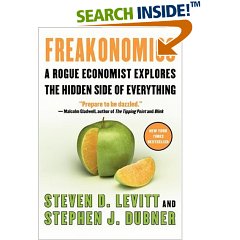
I just finished a great book - Freakonomics! I was reading this book on the bus on the way to the airport, on my way to France to visit a friend. As my friend got on the bus, I greeted her with: "Hi!!! This book is so good!" When asked what it was about, I replied: "Well, there's this economist..." I could see her lose interest instantaneously. So here's the reason why even people who have no interest in economics should read this book.
Yes, there's this economist (Steven D. Levitt) and this writer (Steven J. Dubner), and they decide to write a book using economic theory to answer bizarre questions that don't seem to have any connection to what we normally think of as economics at all. For example: What do children who do well in school have in common? What would be the best way to crush the Ku Klux Klan? How can we discover that school teachers or sumo wrestlers are cheating? What is the connection between someone's name and their level of success? And could legalized abortion have caused crime to drop dramatically in the US? Many of these questions have controversial and/or surprising answers. The book promises not to have any unifying theme or theory, but the moral of the story seems to be that one should always look beyond conventional wisdom and that numbers can tell us fascinating things - things that are interesting even if you have vowed never to be interested in math or money.
Posted by Julie at 1:31 PM | TrackBack
December 13, 2005
Bibliotekets fremtid?

Pappa holdt foredrag om bibliotekets fremtid på fredag, og jeg var med ham for å holde ham våken og peke ut biblioteket på Blindern. Mens han forberedte seg i auditorim 1 på Georg Sverdrups hus, ble jeg spurt om jeg brukte Universitetets bibliotek (se bildene over) mye, jeg som var student og greier. Nei, svarte jeg, for det er alltid fullt.
I foredraget ble det vist bilder av BIs nye bibliotek, som BI er stolte av. Det har de sannsynligvis all grunn til. Det jeg la merke til, var alle de "fleksible plassene" og grupperommene. BI hadde satt seg som mål at deres bibliotek ikke skulle være bare en lagringsplass for bøker, men et sted der arbeid, læring og lesing faktisk finner sted. Universitetets bibliotek er også pent, men det er jo ikke plass til meg! Hva skal jeg med det da?
I eksamenslesningsinnspurten (nei, ikke skippertak, men en innspurt er uungåelig), har jeg nesten ikke vært på Blindern. Der er det fullt av både stressede skikkertakere og forstyrrende gangvandrere som alltid kjenner meg og alltid skal prate med meg når jeg sitter i gangen fordi det ikke er plass på Biblioteket. Jeg har funnet sære alternative leseplasser, men jeg oppgir ikke den informasjonen her, da får jeg ikke være i fred der heller.
Og om det er vanskelig å finne en lesesalplass, er det umulig å finne et sted hvor man kan ha kollokviegruppe. På lesesalen kan man ikke prate. Jeg kjenner at jeg blir hatet bare jeg går gjennom lesesalen med høye hæler. Det er et par kollokvierom i hver lesesal, rom med gjennomsiktige vegger som man har lov til å prate i, men det er for få av dem. Min exphilkollokvie begynte rett og slett å møtes i kantinen. Jeg vet om studenter som setter seg på caféer i sentrum, men der er det en "inngangsbillett" som må betales. Selv gangene utenfor auditoriene på Blindern er opptatt.
Så nei, jeg bruker ikke Biblioteket så mye. Det er synd, fordi det er tydelig at det er et nytt og dyrt bygg, og da er det kjipt å måtte si at det ikke fungerer. Jeg kunne lagt til at det bør være midtgang i svære auditorier og at det enorme inngangspartiet og den tomme kjelleren ser litt teit ut ved siden av den trange lesesalen, men da er jeg vel bare pessimistisk.
Posted by Julie at 9:38 PM | Comments (4) | TrackBack
June 11, 2005
Books I read too early
In my first post I mentioned how historical fiction filled a gap in my life as a reader. As a child I read and expanded my vocabulary very quickly, and the books written for my age group bored me. I reached for books with more complex language, and so I ended up reading books I basically didn’t understand. While I could read every word, I didn’t really get the stories because they were written for adults. Although my “currently reading” list was impressive at age ten, I now have to go back and read it all again. A few examples:
· When I was eight years old, we drove through California, and my parents listened to John Steinbeck’s Sweet Thursday in the car. I wanted to read this story too, so I did. I remember getting really hung up on the tiny details I did understand (for example, I though Mack was wrong to want names for chapters in books), but it took me half the book to realize that Joseph and Mary was one person.
· When I read My Name is Asher Lev, I was about ten. I had just moved back “home” to Norway, and I was supposed to relate to this book because I was a frustrated stranger in my own country. I never really got the point of the book, and I gave up halfway through. Asher Lev’s story was interesting to me in the way physics is interesting: because I couldn’t understand it. I sensed that I would like it if I did though, and I'm going to try again.
· In December 2004, I took an oral exam in English, and I was asked if I had read anything by Edgar Allen Poe besides the short story on my reading list. I said: “Well, I’ve read The Raven, but I was about eleven, so I didn’t really understand much of it.” This statement was apparantly very impressive – this girl was reading Poe at age eleven! Actually, I can’t remember when I first read this poem, so I was probably about seven to nine years old. I just reread it a few minutes ago.
This childhood habit of reading without understanding has had a strange effect on me. Sometimes I still find myself dutifully making my way through a text even though I only understand half of it. Then I’ll stop and wonder why I bother – is it because I love reading even when it’s pointless? Maybe I just feel that if I understand something right away, it’s boring. If a book never makes me think: “Huh?”, I’ve already outgrown it.
Posted by Julie at 1:44 PM | TrackBack
June 8, 2005
Svar på bokspørsmål
1) Hvor mange bøker eier du?
Kommer an på definisjonen av ”eie”. Prøvde nå å telle bøkene på rommet mitt og mistet tellingen litt før 400. Det inkluderte både fagbøker og romaner. Noe av det er lånt, men jeg har i tillegg en del bøker i vesker og i andres bokhyller.
2) Hvilken bok var den siste du kjøpte?
Hmmm... kjøpte en del bøker da jeg var i USA i januar: What I Loved av Siri Hustvedt, The Lady and the Unicorn av Tracy Chevalier, Pirates! av Celia Rees, I Capture the Castle av Dodie Smith, The Sun Also Rises av Ernest Hemingway, The Man in the Iron Mask av Alexandre Dumas og Very Good, Jeeves! av P.G. Wodehouse. Har bare lest tre av dem siden det. Forklaringen er at jeg har fått og lånt en del bøker og dessuten oppdaget et skattkammer: huset vårt er fult av bøker arvet etter besteforeldrene mine. Nå henter jeg en ny bok fra ”familiens bibliotek” hver dag.
3) Hvilken bok var den siste du leste?
Leste Paul Austers The New York Trilogy for bare noen minutter siden. Den er stjålet fra pappa, så han måtte lese Aftenposten. En time før det satt jeg på bussen og leste Winds of War, en murstein av Herman Wouk, med sider så tynne som i Bibelen (men jeg liker den likevel). Og siste bok jeg ble ferdig med? Prozac Nation av Elizabeth Wurtzel.
4) Nevn fem bøker som betyr mye for deg, og som du har lest mer enn tre ganger.
Juksespørsmål! Jeg er overbevist om at denne spørretingen er beregnet på folk som er eldre enn meg. Jeg er bare atten, så alle bøker jeg har lest mer enn tre ganger, må være korte barnebøker. Jeg begynner ikke på nytt med en gang jeg er ferdig, uansett hvor bra den er (ok, det har hendt). Her er i hvert fall noen bøker jeg har lest flere ganger:
· The Lord of the Rings er selvsagt øverst på listen. Ikke bare fordi Tolkien imponerer meg og historien er god, men fordi den har blitt en del av min kultur. Jeg har hørt at Tolkien skrev om Middle Earth for at England skulle få litt sagn og myter som han mente at de manglet. Det er det LotR har blitt for meg: en historie jeg har vokst opp med og som jeg kjenner bedre enn folkeeventyrene og den norrøne mytologien.
· To Kill a Mockingbird, av Harper Lee, har jeg faktisk lest mer enn tre ganger, og hver gang liker jeg den enda litt bedre. I USA er den blitt en av de vanligste lese-med-skoleklassen klassikerne, men jeg er glad for at jeg fikk oppdage den på egen hånd.
· Jeg nevner alle amerikanske historical fiction bøker som jeg leste i barndommen under samme punkt. De har gitt meg et stort forsprang i historiefaget. Samtidig fylte de et tomrom da jeg hadde vokst fra barnebøker, men ikke forsto voksen litteratur med moderne kulturelle og politiske referanser. Jeg anbefaler Ann Rinaldi som har dekket omtrent hele USAs historie med romaner, og Celia Rees som har skrevet både om hekser og sjørøvere (skulle trodd hennes bøker var skrevet spesielt til meg).
· I en anmeldelse av Siri Hustvedts What I Loved, ble det skrevet: ”Paul Auster, much to his chagrin, may soon become the guy who’s married to Siri Hustvedt.” Noen vil si at dette er å gå litt over streken, men den eneste grunnen til at jeg begynte å lese Austers New York Trilogy er at han er mannen til hun som skrev What I Loved. Denne boken er så herlig detaljert. Personene er alle interessante mennesker som forteller leseren fascinerende ting når det ikke skjer noe annet i handlingen.
· Hmmm... et siste punkt... Da nevner jeg til slutt Hemingways noveller, det meste av Remarque, Adeline Yen Mahs bøker om kinesisk historie (nei, jeg har ikke lest Ville Svaner, men den er sikkert bra, og jeg skal nok lese den en gang) og Shel Silversteins diktsamlinger (for de har jeg lest sikkert 30 ganger).
Jeg kunne fortsatt en stund, men jeg ser nå at jeg heller må starte nye lister.
Boklister som kommer på denne bloggen etterhvert:
1. Ubetydelige, ukjente bøker som jeg elsker uten helt å vite hvorfor
2. Betydelige, kjente bøker som egentlig er dårlige
3. Bøker jeg har lovet andre mennesker at jeg skal lese en gang
4. En egen liste for de beste historical fiction bøkene
5) Oppfordre fem personer til å fylle ut denne i sin blogg.
Ha! Gjør jeg det, kommer liste 3 til å bli laaang. Dessuten kjenner jeg ikke så mange bloggere som ikke allerede har skrevet denne.
Posted by Julie at 8:30 PM | Comments (2) | TrackBack
